Category: Nationalization
May 21st, 2017 by geoffhodgson1946
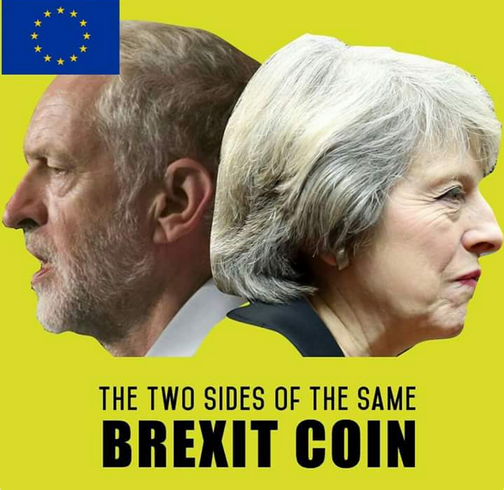
Geoffrey M. Hodgson
Although the two biggest UK political parties are very different in important respects, Labour under Jeremy Corbyn and the Conservatives under Theresa May have each converged on different forms of pro-Brexit, economic nationalism.
Economic nationalism prioritises national and statist solutions to economic problems. Although it does not shun them completely, it places less stress on global markets, international cooperation and the international mobility of capital or labour. It believes that the solutions to major economic, political and social problems lie within the competence of the national state.
 Other countries have turned in the same direction, including the United States under Donald Trump and Russia under Vladimir Putin. Previously, both Soviet-style and fascist economies have embraced economic nationalism. China has continued along this road, even after its acceptance of private enterprise and a market economy.
Other countries have turned in the same direction, including the United States under Donald Trump and Russia under Vladimir Putin. Previously, both Soviet-style and fascist economies have embraced economic nationalism. China has continued along this road, even after its acceptance of private enterprise and a market economy.
Economic nationalism has been used successfully as a tool of economic development, by creating a state apparatus to build an institutional infrastructure and mobilise resources. But it brings severe dangers as well as some advantages. Its reliance on nationalist rhetoric can feed intolerance, racism and extremism.
Furthermore, as it concentrates economic and political power in the hands of the state, economic nationalism undermines vital checks and balances in the politico-economic architecture.
As numerous social scientists (from Barrington Moore to Douglass North) have shown, democracy and human rights cannot be safeguarded without a separation of powers, backed by powerful countervailing politico-economic forces that keep the state in check.
From Thatcherism to Mayhem: Tory economic nationalism
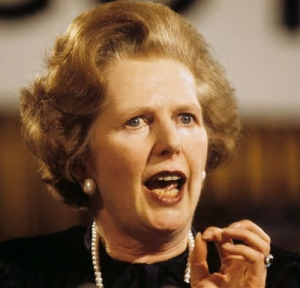
Margaret Thatcher
In the 1970s, Margaret Thatcher changed the Tory party from a paternalist party of the elite to a more radical, free-market and individualist force, embracing the ideologies of Friedrich Hayek and Milton Friedman.
A logical consequence of this market fundamentalism was to embrace the European Single Market, which her successor John Major did in the Maastricht Treaty of 1992. But this was too much for the Tory nationalists, who were already turning against the European Union and all its works.
The tension grew within the Tories between those that pursued international markets in the name of market fundamentalism, and those who worried that global trade and the free movement of labour were undermining the powers of the British nation state.
A compromise option – widely touted during the June 2016 EU referendum – was to exit the EU but remain in the single market. But a major implication of this was that the free movement of labour to and from the EU would have to be retained. May became prime minister and declared that Britain would leave the single market as well as the EU.
This marks a major ideological shift within the Conservative Party. The pursuit of free markets, promoted so zealously by Thatcher, has moved down the Tory agenda, in favour of nationalism, increased state control, reduced parliamentary scrutiny, and lower immigration, whatever the economic costs.
Forward together: the new-old Toryism
This shift is signalled by a remarkable passage in the 2017 Conservative general election manifesto:
“We do not believe in untrammelled free markets. We reject the cult of selfish individualism.”
This could be interpreted as a cynical attempt to attract some Labour voters. Probably, in part, it is. But there is much more to it than that. It shows how all the whingeing about “neoliberalism” is now outdated and much off the mark.
Crucially, the Tory Party was traditionally opposed to “untrammelled free markets” and it worried about the destructive and corrosive effects of individualism and greed.
As Karl Polanyi pointed out in his classic book on The Great Transformation, the first fighters for factory and employment legislation, to protect workers from the results of reckless industrialization in the 1830s and 1840s, were from the ranks of the church and the Tory Party:
“The Ten Hours Bill of 1847, which Karl Marx hailed as the first victory of socialism, was the work of enlightened reactionaries.”1
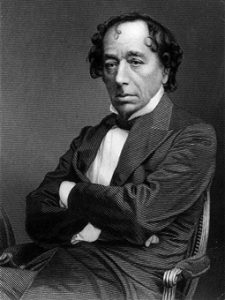
Benjamin Disraeli
Tories like Anthony Ashley-Cooper, the Seventh Earl of Shaftesbury, were great nineteenth-century social reformers. The Tory Prime Minister Benjamin Disraeli railed against selfish individualism, particularly in his novels. For Disraeli, British imperialism was more important than unalloyed individualism.
May has brought the Tory party back to its pre-Thatcher roots. But, less enlightened than Shaftesbury or Disraeli, she has little appetite for protective legislation or constitutional reform. Instead, she celebrates her own powers of leadership and seeks a mandate to concentrate power in her hands.
She has little enthusiasm for democracy either. If it were not for the heroic efforts of Gina Miller and the decision of the Supreme Court, the triggering of Article 50 – to start the process of leaving the European Union – would have been taken by the executive without a parliamentary vote.
The 2017 Tory manifesto is a maypole for nationalism. “Britain” is one of its most-used words. It says that immigration will be brought down, while existing powers by the British state to read emails and monitor your activity on the web will be increased. She will create an Internet that is controlled by the state. May is developing the infrastructure of an authoritarian nationalist regime.
Bringing the state back in: Labour’s new-old economic nationalism
At least on the surface, there are dramatic differences with Labour’s manifesto, which, for example, contains more measures targeted at the poor and elderly. Labour also gives much more verbal emphasis to human rights and democracy.
But at the core of Labour’s 2017 manifesto is a strong dose of economic nationalism, with Labour’s greatest commitment to public ownership since the “suicide note” manifesto of 1983. There are plans to bring the railways, energy, water and the Royal Mail all back into public ownership.
The 2017 manifesto declares: “Many basic goods and services have been taken out of democratic control through privatization.” But there is little explanation of what “democratic control” would mean under public ownership.
How would it work? Would parliament take decisions on everything? In reality these proposals – whatever their other merits – would enlarge state bureaucracy: there is no explanation how they would extend democracy.
The words “control” or “controls” appear 32 times in the 2017 manifesto. There is insignificant explanation of how “controls” work. The Labour manifesto envisions a concentration of economic power in the hands of the state, notwithstanding its verbal commitment to regional and local, as well as national, public management.
While there are commendable measures to enhance and enlarge an autonomous sector of worker-owned enterprises, there is little recognition of the importance of having a viable and dynamic private sector as well.
Corbyn’s Labour: forward to the past
As May has brought the Tories back to the pre-Thatcher years, Corbyn has brought Labour back to its traditional roots, before the leadership of Tony Blair.
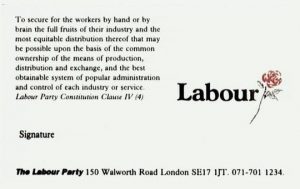 With his 1995 changes to Clause Four of the Labour Party Constitution, Blair brought in an explicit commitment to a dynamic private sector. Labour stood for an economy where “the enterprise of the market and the rigour of competition are joined with the forces of partnership and co-operation”. Corbyn has returned to the spirit of Labour pre-1995 constitution, even if he has not yet changed the wording.
With his 1995 changes to Clause Four of the Labour Party Constitution, Blair brought in an explicit commitment to a dynamic private sector. Labour stood for an economy where “the enterprise of the market and the rigour of competition are joined with the forces of partnership and co-operation”. Corbyn has returned to the spirit of Labour pre-1995 constitution, even if he has not yet changed the wording.
Corbyn has proposed that Britain can be “better off” outside the EU. He argued that EU rules block the kind of state-heavy industrial policy that he favours. But EU countries such as France and Germany already have strong interventionist policies for industrial and infrastructural development. In truth, Corbyn favours repeated doses of statist socialism in one country.
With some Stalinist exceptions in his coterie, Corbyn and his followers are mostly sincere in their commitment to democracy and human rights. But what they do not understand is that their proposed statist concentration of economic power will undermine countervailing politico-economic forces that can help to keep the state leviathan in check.

Jeremy Corbyn and Hugo Chávez
These countervailing and separated powers are vital. Especially in times of hardship or crisis, there will be a temptation by some in power (at the local or national level) to abuse rights and undermine democracy. Every single historical case shows this result.
Attempts “to take control of the economy”, even with measures of decentralization and local power, have led to restrictions on press freedom, arbitrary detentions, abuses of human rights, and even famine.
Forward together: economic nationalists take the helm
Further doses of economic nationalism may be possible in a country as large as the United States. In 2015, exports from the USA amount to about 13 per cent of GDP. Hence economic nationalists in the USA can reduce trade without too much contraction of the economy. It may turn further inwards, cut imports and still survive a loss of exports.
But the UK has become a globally-orientated, open economy, exporting 28 per cent of its GDP in 2015. About 45 per cent of these exports go to the European Union.
 By exiting the EU Single Market, and by walking away from EU trade deals with non-EU countries that benefit EU member states, Labour and the Tories would threaten the UK economy with a massive downturn. The British economy would fall off a cliff.
By exiting the EU Single Market, and by walking away from EU trade deals with non-EU countries that benefit EU member states, Labour and the Tories would threaten the UK economy with a massive downturn. The British economy would fall off a cliff.
In this crisis, rightist economic nationalists will blame foreigners and immigrants, and leftist economic nationalists will blame the rich.
It will be “the few” – designated by their ethnicity or by their assets – who will get the blame. Their rights will be under threat, as so will the liberties of all of us. Whatever variety is chosen, economic nationalism could severely undermine the viability of democracy in the UK.
21 May 2017
Minor edits – 23, 28 May, 29 June
|
This book elaborates on some of the political issues raised in this blog:
Wrong Turnings: How the Left Got Lost
Published by University of Chicago Press in January 2018
|
Endnote
Bibliography
Hodgson, Geoffrey M. (2017) Wrong Turnings: How the Left Got Lost (Chicago: University of Chicago Press, forthcoming).
Moore, Barrington, Jr (1966) Social Origins of Dictatorship and Democracy: Lord and Peasant in the Making of the Modern World (London: Allen Lane).
North, Douglass C., Wallis, John Joseph and Weingast, Barry R. (2009) Violence and Social Orders: A Conceptual Framework for Interpreting Recorded Human History (Cambridge and New York: Cambridge University Press).
Polanyi, Karl (1944) The Great Transformation: The Political and Economic Origins of Our Time (New York: Rinehart). See esp. pp. 165-66.
Posted in Brexit, Common ownership, Democracy, Donald Trump, Immigration, Jeremy Corbyn, Labour Party, Left politics, Liberalism, Markets, Nationalization, Politics, Populism, Private enterprise, Property, Right politics, Tony Blair, Tony Blair, Uncategorized, Venezuela
May 8th, 2017 by geoffhodgson1946
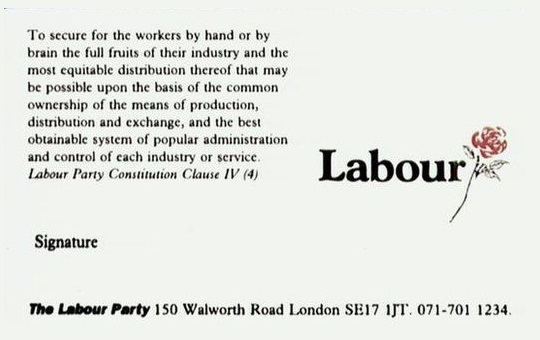
Geoffrey M. Hodgson
This is in part a personal memoir – concerning my role in a minor episode in political history. More importantly, it has lessons concerning Labour’s ideological inertia – the difficulty of modernising the party and bringing it from the nineteenth to the twenty-first century.
Socialism and Labour’s Clause Four
Both Robert Owen and Karl Marx defined socialism as “the abolition of private property”. This kind of collectivist thinking was encapsulated in Clause Four, Part Four of the Labour Party Constitution when it was adopted in 1918:
“To secure for the workers by hand or by brain the full fruits of their industry and the most equitable distribution thereof that may be possible upon the basis of the common ownership of the means of production, distribution and exchange, and the best obtainable system of popular administration and control of each industry or service.”
This provided for no exception: all production would be in common ownership and there would be no private sector. Although some Labour Party thinkers began to entertain the possibility of some private enterprise, many party members remained resolutely in support of widespread common ownership.

Clement Attlee
In 1937, eight years before he became Prime Minister, Clement Attlee approvingly quoted the words of Bertrand Russell: “Socialism means the common ownership of land and capital together with a democratic form of government. … It involves the abolition of all unearned wealth and of all private control over the means of livelihood of the workers.”
After 1945, the position of many leading Labour Party members began to shift. First the realities of gaining and holding on to power – as a majority party for the first time – dramatized the political and practical unfeasibility of abolishing all private enterprise. Some nationalization was achieved, but a large private sector remained.
In 1956 C. Anthony Crosland published The Future of Socialism. This sought a reconciliation with markets, private enterprise and a mixed economy. In 1959 the (West) German Social Democratic Party abandoned the goal of widespread common ownership. In the same year, Hugh Gaitskell tried to get the British Labour Party to follow this lead, but met stiff resistance. Clause Four remained intact.
Richard Toye noted that the Labour Party assumed widespread public ownership and failed to develop adequate policies concerning the private sector:
“Labour, until at least the 1950s, showed little interest in developing policies for the private sector. During the 1960s, the party demonstrated continuing ambiguity about whether or not competition was a good thing. This ambiguity continued at least until the 1980s.”
The Thatcher Revolution
There were Labour governments from 1964 to 1970 and from 1974 to 1979. But then Margaret Thatcher came to power.
After this defeat, Labour’s instinct was to turn to the left, in the belief that it could have held onto power if it had held to classical socialist principles. Michael Foot was elected as leader, and Dennis Healey narrowly defeated Tony Benn for the position of deputy leader.
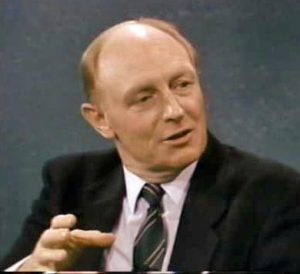
Neil Kinnock
Despite a severe recession with millions unemployed, following the implementation of monetarist austerity policies, Labour suffered a massive defeat in the 1983 general election. Labour’s share of the vote fell below 28 per cent – the party’s lowest figure since 1918. Michael Foot resigned as leader and Neil Kinnock took his place.
Thatcher had boosted her popularity due the Falklands War. One of Thatcher’s most popular domestic policies was to promote the sale of council-owned housing to the tenants. Labour had opposed this policy. The 1983 defeat prompted a rethink, on this and other issues.
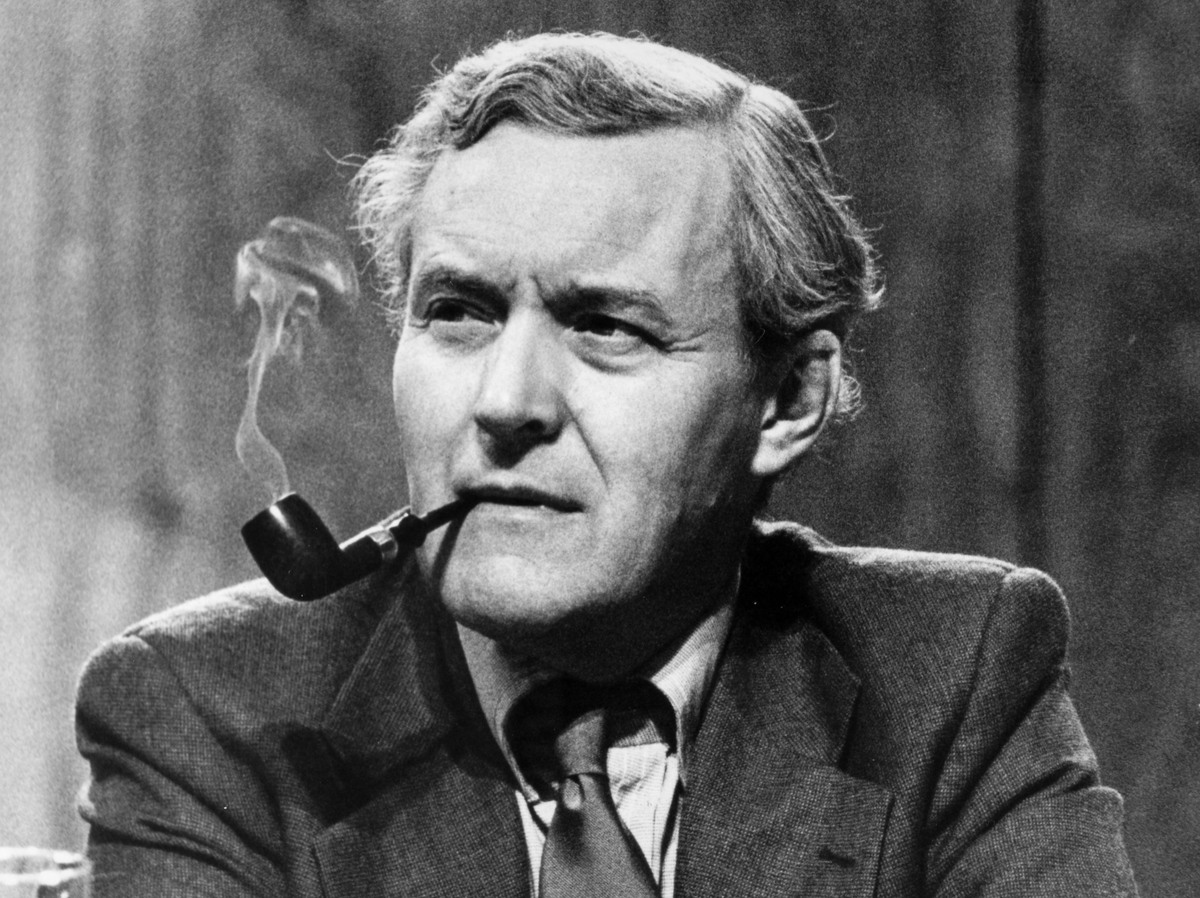
Tony Benn
For some of us, this rethink amounted to more than expedient doctrinal trimming. Encouraging home ownership was really a good idea: why should all property be owned by the rich? But while supporting home ownership, we argued that the government should also build more social housing and enlarge the stock available for rent by low-income families.
But these ideas met stiff resistance in the Labour Party ranks, and not simply from Trotskyist entryists such as Militant. The resistance from Tony Benn and his supporters was substantial and even more enduring. It was clear that old-fashioned socialist ideas still had a tenacious appeal for Labour’s membership.
The Labour Coordinating Committee
The Labour Coordinating Committee (LCC) became one of the primary modernising forces within Labour. Its leadership included Hilary Benn, Cherie Blair, Mike Gapes, Peter Hain, Harriet Harman and others of enduring fame. I was elected to its executive committee. We worked closely with Kinnock and members of his shadow cabinet, including Robin Cook.
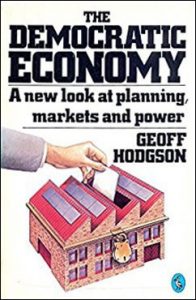 I had written a book entitled The Democratic Economy where I argued that socialists should support a permanent private sector in the economy. The book was published by Penguin in 1984. Another influential work at the time was Alec Nove’s Economics of Feasible Socialism, which also argued for a substantial role for markets.
I had written a book entitled The Democratic Economy where I argued that socialists should support a permanent private sector in the economy. The book was published by Penguin in 1984. Another influential work at the time was Alec Nove’s Economics of Feasible Socialism, which also argued for a substantial role for markets.
On 26 November 1983, at the Labour Coordinating Committee AGM in Birmingham, I proposed that Clause Four of the Labour Party constitution should be rewritten to include an acceptance of a private sector and a role for markets. But I was defeated over the idea that Clause Four should be rewritten. This was out of fear of antagonising the Benn wing. Instead, the LCC resolved that Clause Four should be “clarified”.
But a resolution on long-term aims, which I had helped to draft, was passed by a large majority. The resolution called for the Labour Party to draft a new statement of aims, upholding “that socialism involves extended democracy and real equality. Democracy under socialism is extended to industry and the community … and must involve a substantial decentralisation of power.”
Equality meant the “absence of discrimination on the basis of gender and race, universal freedom from poverty, and a widespread distribution of wealth and power, as well as formal equality under the law and universal suffrage.”
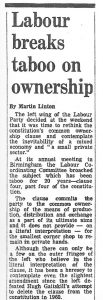 There was a commitment to “political pluralism” and to “economic pluralism” involving “a variety of forms of common ownership … and the toleration of a small private sector including self-employed workers and other private firms.” The economy must be dominated by mechanisms of “democratic planning … but also accommodating a market mechanism in some areas.”
There was a commitment to “political pluralism” and to “economic pluralism” involving “a variety of forms of common ownership … and the toleration of a small private sector including self-employed workers and other private firms.” The economy must be dominated by mechanisms of “democratic planning … but also accommodating a market mechanism in some areas.”
There was also a “commitment to internationalism, disarmament and peace” and “a disengagement from the power blocs” of the West and East.
I think that today Jeremy Corbyn and his followers would accept much or all of this, at least as a temporary stopping-point on the road to full socialism. But in the 1980s there was strong hostility to these revisionist ideas from within Labour’s ranks at the time, including from Corbyn and Tony Benn.
Since then my own views have adjusted. See my Wrong Turnings book. But this blog is not primarily about me. It is about what has happened to the Labour Party and how difficult it is to change its DNA.
For a while, the LCC tried to keep the conversation going on the need to revise Labour’s aims. The Guardian newspaper reported the LCC conference with the headline: “Labour breaks taboo on ownership”.
The LCC held a conference in Liverpool in June 1984 on “The Socialist Vision”. But enthusiasm for this discussion fizzled out. Many leaders of the LCC wanted a political career, and they wished to widen their support on constituency selection committees.
By 1985 the LCC’s revisionist initiative had been kicked into the long grass. My efforts to change Clause Four had failed.
From Kinnock to Blair
But to their credit, Neil Kinnock and his deputy Roy Hattersley saw the need for Labour to modernise its aims. I advised them both for a while. Another election defeat in 1987 spurred a rethink. But by then I had become inactive in the Labour Party.
As Richard Toye has recorded, in 1988 Kinnock and Hattersley presented a new document on “Aims and Values” to Labour’s National Executive Committee. But “it was criticised by John Smith, Bryan Gould and Robin Cook as being too enthusiastic about the benefits of the market, and was watered down accordingly”.
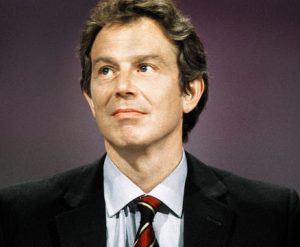
Tony Blair
Clearly, even after a third election defeat there was still strong resistance, from both the “soft” and the “hard left”, to the idea of embracing markets and private property.
After the next election defeat in 1992, Kinnock stood down. He was replaced by John Smith, who died tragically from a heart attack. Then Tony Blair became leader, with a firm resolve to modernize the party. Four election defeats had made the majority of members more receptive to his ideas.
Blair’s Revision of Clause Four
In 1995, after 77 years, Clause Four was changed. Tony Blair successfully ended the Labour Party’s longstanding constitutional commitment to far-reaching common ownership. Tony Benn protested: “Labour’s heart is being cut out”. The new wording of “Clause IV: Aims and Values” began as follows:
“The Labour Party is a democratic socialist party. It believes that by the strength of our common endeavour we achieve more than we achieve alone, so as to create for each of us the means to realise our true potential and for all of us a community in which power, wealth and opportunity are in the hands of the many not the few; where the rights we enjoy reflect the duties we owe and where we live together freely, in a spirit of solidarity, tolerance and respect.”
The 1918 formulation did not use the word socialism – it had common ownership instead. Ironically, Blair introduced the term in 1995. But he attempted to change its meaning. He promoted “social-ism”, which now meant recognizing individuals as socially interdependent. It also signalled social justice, cohesion and equality of opportunity.
The new Clause Four continued, to make a significant statement in support of competiive markets and a private sector. Labour now stood for:
“A DYNAMIC ECONOMY, serving the public interest, in which the enterprise of the market and the rigour of competition are joined with the forces of partnership and co-operation to produce the wealth the nation needs and the opportunity for all to work and prosper with a thriving private sector and high-quality public services …”
The text went on to cover “a just society”, “an open democracy”, “a healthy environment” and “defence and security”.
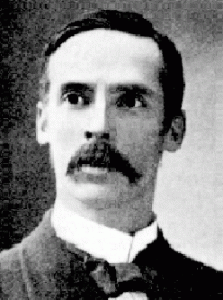
John A Hobson
Labour’s new aims and values were indistinguishable from the earlier views of radical social liberals, such as T. H. Green, J. A. Hobson and David Lloyd George. And with its endorsement of “the rigour of competition” and “a thriving private sector” it was a hundred miles away from the collectivism of Robert Owen and other original socialists.
Instead of tackling the problem of its old collectivist DNA more directly, Blair tried to change the meaning of socialism and even rewrote parts of its own history. It is unsurprising that the old socialist DNA survived. It remained viable, partly because Labour still declared itself as socialist. Blair made radical changes but also gave succour to the traditional socialist wing of the party.
Blair’s popularity within the party had waned even before his decision in 2003 to support George W. Bush’s Iraq War. Much of this disenchantment was due to his abandonment of wholesale common ownership.
Blair had failed to develop a fully-fledged alternative vision within Labour to replace old-fashioned common ownership. He had made Labour implicitly embrace liberalism in doctrine. But this was unspoken, and masked by the explicit insertion of socialism in its aims. This inadvertently played into the hands of the party’s enduring, backward-looking left.
Labour’s Love Lost
Just as Labour had shifted to the left after losing power in 1979, after its 2010 defeat it shifted slightly leftwards under Ed Miliband. But the new leader had no clear alternative to the economics of austerity. So after another defeat in 2015. the party membership took a massive lunge to the left. It elected the Bennite, retro-Marxist, perennial protestor, Jeremy Corbyn.
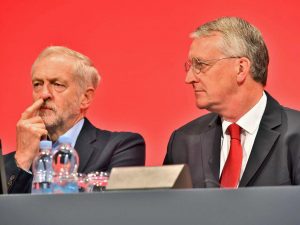 But while old ideas within Labour had survived, the structure of the party and its electoral base had changed enormously in the period from 1983 to 2015. Kinnock had relied on the moderating force of the trade unions, to fight the hard left and move the party toward electability. But by 2015 the unions had been gravely weakened and several had moved toward the hard left.
But while old ideas within Labour had survived, the structure of the party and its electoral base had changed enormously in the period from 1983 to 2015. Kinnock had relied on the moderating force of the trade unions, to fight the hard left and move the party toward electability. But by 2015 the unions had been gravely weakened and several had moved toward the hard left.
In 1983, both the affiliated unions and the Labour MPs had a major role in the election of any new Labour leader. But by 2015 the power was almost entirely in the hands of the Labour Party membership, and the other moderating forces were much diminished.
Labour’s history shows how difficult it has been to change Labour’s old-fashioned socialist DNA. Those that put their faith in a revival of moderation within must take into account the near-collapse of those internal forces that brought the party back to sanity in 1951-1964 and in 1979-1997.
In 1983 there was still a strong, traditional, tribal, Labour vote, part of it based on surviving industries such as coal and steel. By 2015 the working class was much more fragmented, with skilled, aspirational cohorts at one extreme, and uneducated, demoralized, welfare dependents at the other.
The old tribalism was challenged by UKIP and by a revived working class Conservatism, playing the nationalist card. Labour’s potential electoral base has been transformed beyond recognition. The division of labour has become profoundly political, as well as enduringly economic.
Today, there seems little hope for a party that calls itself “Labour”, just as there is no future for a party that retains the word “socialism” or the goal of widespread public ownership. The socialist experiments of the twentieth century testify to their failure. Labour, in short, is an anachronism.
8 May 2017
|
This book elaborates on some of the political issues raised in this blog:
Wrong Turnings: How the Left Got Lost
Published by University of Chicago Press in January 2018
|
References
Attlee, Clement R. (1937) The Labour Party in Perspective (London: Gollancz).
Blair, Tony (1994) Socialism, Fabian Pamphlet 565 (London: Fabian Society).
Clarke, Peter (1978) Liberals and Social Democrats (Cambridge: Cambridge University Press).
Hodgson, Geoffrey M. (1984) The Democratic Economy: A New Look at Planning, Markets and Power (Harmondsworth: Penguin).
Hodgson, Geoffrey M. (2017) Wrong Turnings: How the Left Got Lost (Chicago: University of Chicago Press, forthcoming).
Nove, Alexander (1983) The Economics of Feasible Socialism (London: George Allen and Unwin).
Toye, Richard (2004) ‘The Smallest Party in History’? New Labour in Historical Perspective’, Labour History Review, 69(1), April, pp. 83-104.
Posted in Common ownership, Democracy, Jeremy Corbyn, Karl Marx, Labour Party, Left politics, Liberalism, Markets, Nationalization, Politics, Private enterprise, Property, Robert Owen, Socialism, Tony Benn, Tony Blair, Tony Blair
February 21st, 2017 by geoffhodgson1946
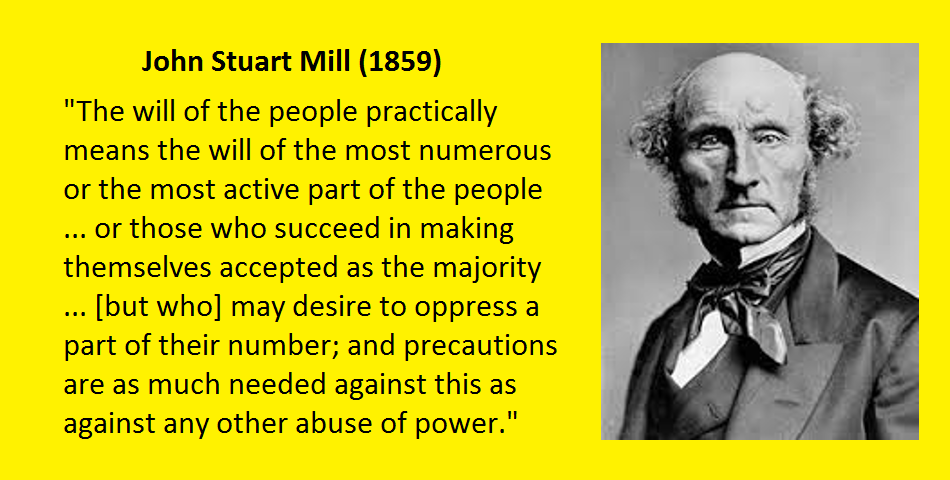
Geoffrey M. Hodgson
Despite her previous opposition to Brexit, Prime Minister Theresa May tells us that the UK must quit the European Union because it is “the will of the people”. Despite aligning himself in the Remain campaign during the referendum, opposition leader Jeremy Corbyn says that we must pursue Brexit because it is “the will of the people”. Many Labour MPs, who are critical of Corbyn and believe that leaving the EU will be a disaster, voted to start the exit process, without any guarantees or conditions, because it is “the will of the people”.
This is now the dreadful state of our democracy. On crucial matters such as immigration and Brexit, we are governed by tabloid headlines, opinion polls and lie-infested referendums. The “will of the people” has become the catch-phrase of the cowering, lazy or unprincipled politician. No longer driven by truth or principle, many of them knowingly connive in disaster because it is regarded as the peoples’ will.
Where can following “the will of the people” lead?
Polls show that the use of torture has sometimes, even recently, received majority support from the US public. President Donald Trump was elected after expressing a desire to re-introduce torture. Torture is “the will of the American people” – as some might put it.
But the use of torture has been against the Eighth Amendment to the United States Constitution since 1791. The very role of a constitution is to help protect rights and freedoms, even if “the will of the people”, or of a deviant President or Prime Minister, would take them away. One of the limits to democracy is that it should not be able to overturn our human rights.
 Dictators and populists are fond of referendums because they deploy “the will of the people” against constitutional safeguards. Hitler held a referendum in 1933, to garner mass support to withdraw from the League of Nations. In 1934 he held another referendum, which endorsed his bid for supreme power in Germany. Yet another referendum in 1936 ratified Hitler’s military occupation of the Rhineland and his one-party state. A fourth referendum in 1938 approved Hitler’s annexation of Austria. All propositions in these plebiscites received huge majorities.
Dictators and populists are fond of referendums because they deploy “the will of the people” against constitutional safeguards. Hitler held a referendum in 1933, to garner mass support to withdraw from the League of Nations. In 1934 he held another referendum, which endorsed his bid for supreme power in Germany. Yet another referendum in 1936 ratified Hitler’s military occupation of the Rhineland and his one-party state. A fourth referendum in 1938 approved Hitler’s annexation of Austria. All propositions in these plebiscites received huge majorities.
The death penalty
In recent polls in the USA, 60 per cent of the adult population supported the death penalty for murder, despite 64 per cent also believing that it does not lower the murder rate and 59 per cent believing that innocent people had been wrongly executed in the previous five years.
 In the UK in 1983, around 75 per cent of people were in favour of the death penalty. Although recent polls show a lower level of support, it is still close to 50 per cent.
In the UK in 1983, around 75 per cent of people were in favour of the death penalty. Although recent polls show a lower level of support, it is still close to 50 per cent.
Imagine that we had a referendum to re-introduce the death penalty in the UK. Thanks to some reactionary newspapers, it is possible that the proposal would gain majority support. But that does not justify its re-introduction, even if it was “the will of the people”. The morality of a law cannot be decided by popular vote.
Should homosexual acts be legal?
In some states of the USA there were laws prohibiting sodomy (between same-sex or different-sex couples) until 2003. As recently as 2004, the number of people polled in the USA who thought that homosexual acts should be illegal exceeded the number who thought they should be legal.
 By these measures, according to “the will of the people” homosexual acts should not have been made legal in 2003 or 2004.
By these measures, according to “the will of the people” homosexual acts should not have been made legal in 2003 or 2004.
But opinions change. This is another major problem with being governed by “the will of the people”.
After 2004, support in the USA for the legality of homosexual acts rose steadily. By 2016, the number supporting legality exceeded the contrary view by 40 per cent.
in the UK, as recently as 1998, 50 per cent of respondents in a poll thought that homosexual acts were “always” or “mostly” wrong, compared with 31 per cent saying they were “rarely” or never wrong.
Since then, opinion has switched, largely because leading politicians in the Tory as well as other major parties (with the notable exception of UKIP) have countered a sizeable segment of public opinion and underlined gay rights as a matter of principle.
By 2012, only 28 per cent of respondents in the UK thought that homosexual acts were “always” or “mostly” wrong, compared with 57 per cent saying they were “rarely” or never wrong. The will of the people can change.
The “will of the people” can be wrong or immoral
Whatever the “will of the people”, homosexual acts are either morally admissible or immoral. Moral principles are not determined by referendums or opinion polls.
 Instead, they must be the subject of ongoing, informed debate, guided by the need to minimise harm, alongside “an egalitarian conception of the good, focusing on equal opportunities for a worthwhile life” (as Philip Kitcher puts in his important book on The Ethical Project).
Instead, they must be the subject of ongoing, informed debate, guided by the need to minimise harm, alongside “an egalitarian conception of the good, focusing on equal opportunities for a worthwhile life” (as Philip Kitcher puts in his important book on The Ethical Project).
Consider another illustration. In 1984, 49 per cent of the UK public agreed “a man’s job is to earn money; a woman’s job is to look after the home and family”. But by 2012, only 13 per cent subscribed to this view.
Considerations of equal rights and equality of opportunity militate against such gendered attitudes and the discrimination that they sustain. While there is much more to be done, arguments have been won, opinions have changed and progress has been made. People can be persuaded that their previous opinions were wrong.
The need for experts
Just as votes cannot establish what is moral or immoral, they cannot determine what is scientifically valid and what is not. A majority of Americans would disregard claims concerning human-induced climate change. For many Americans, they are all part of a “hoax” to promote more intervention by the Federal Government.
Democratic votes cannot establish the veracity of scientific claims. Science proceeds through detailed scrutiny of claims by experts in a specialist field and a dialogue of different expert views. It thus creates an evolving consensus over what truths have been established and what research must be prioritised for further investigation.
 In the case of climate change, there is a strong consensus that human activity is leading to global warming. Albeit imperfect, this is the best indication we have of scientific truth. It is not the opinion of the general public, most of whom do not understand climate science.
In the case of climate change, there is a strong consensus that human activity is leading to global warming. Albeit imperfect, this is the best indication we have of scientific truth. It is not the opinion of the general public, most of whom do not understand climate science.
Another common fallacy, perpetrated by people who do not understand economics, is that we should treat the budgeting problems of a national economy in the same way that we treat our individual or household budgets. This is the “every housewife knows” economics of Margaret Thatcher and her ilk.
This mistaken view ignores the capacity of many sovereign states to issue money and sustain deficits: unlike individuals or firms, such states cannot go bankrupt. It ignores the fact that what may be true for an individual may not be true in the aggregate, as Keynesians and others have pointed out for decades.
Many economists (possibly most economists in the UK) accept this Keynesian argument. But it is difficult to get the point across to the general public, so that they elect governments that pursue austerity policies, which reduce aggregate demand and economic growth, leading to increased debt.
The role of democracy
If the behaviour of most British MPs over Brexit were taken as a guide, there would be no role for MPs at all. They blindly follow “the will of the people”, even when they know that it will lead to adverse economic and political outcomes.
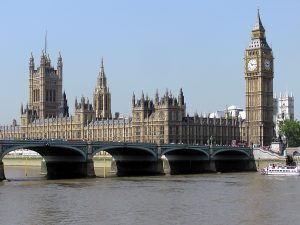 If this were a valid guiding rule, then MPs would be redundant. They could be replaced by online opinion polls on every question. The public would be invited to vote over every piece of legislation and “the will of the people” could be upheld.
If this were a valid guiding rule, then MPs would be redundant. They could be replaced by online opinion polls on every question. The public would be invited to vote over every piece of legislation and “the will of the people” could be upheld.
Before long we might be putting immigrants in sealed trains to remote or foreign destinations, and publicly flogging delinquents to teach them a lesson.
Democracy is vital not because it provides a means of implementing “the will of the people” on any specific proposal. The primary purpose of democracy is to legitimate government. It replaces unacceptable claims that rulers are legitimised by the “will of God” or by their family lineage.
There is a strong case for improving our democratic institutions, and the functioning of democracy itself. There are also forceful arguments for increasing participation in some local and workplace decisions, where we are intimately affected and have local knowledge. But there are severe practical and moral limits to the extension of democracy over all our affairs.
At least at the national level, in any large and complex socio-economic system, democracy must involve representatives rather than delegates. Representatives must be given some autonomy to seek expert advice and make judgments on complex issues. Extensive participatory democracy in such circumstances is both unfeasible and undesirable.
Members of Parliament receive a mandate from their electorates to represent their interests. Representing interests does not mean polling opinions: that is the lazy and irresponsible option. Instead it is a matter of exercising informed judgment. It is a question of deliberation and interpretation, involving the use of expert advice. We know that MPs often get things wrong. That is why their constituents have the opportunity to remove them at the next election.
The reactionary media are not solely to blame
The reactionary media and their malign influence on public opinion are not the sole cause of the current political malaise in Britain and the USA. Among others, one can blame the intellectually-lazy part of the Left, which trots out the mantra of “democratic control” whenever it sees a policy problem.
One can also blame the majority of economists, who have abandoned all moral considerations save for utility maximisation (or mere “satisfaction”) by “rational fools” (the term used by Nobel Laureate Amartya Sen).
Hence it is not just the reactionary media that are to blame. Many political activists have been intellectually lazy for too long. We need an enhanced and better-informed conversation concerning rights, morality and practical institutional design.
Armed with this knowledge, we need to hold our representatives to account, and expose the laziness and lack of principle of those who blindly follow “the will of the people”. If they see themselves as nothing more than unintelligent voting machines, then they should give up their positions to others, who would be guided by moral principles and offer greater dedication to the true interests of the people that they are supposed to serve.
21 February 2017
Minor edits – 28 February, 7 March, 4 May
|
This book elaborates on some of the political issues raised in this blog:
Wrong Turnings: How the Left Got Lost
Published by University of Chicago Press in January 2018
|
Bibliography
Hodgson, Geoffrey M. (2017) Wrong Turnings: How the Left Got Lost (Chicago: University of Chicago Press, forthcoming).
Kitcher, Philip (1993) The Advancement of Science: Science without Legend, Objectivity without Illusions (Oxford and New York: Oxford University Press).
Kitcher, Philip (2011) The Ethical Project (Cambridge MA: Harvard University Press).
Sen, Amartya K. (1977) ‘Rational Fools: A Critique of the Behavioral Foundations of Economic Theory’, Philosophy and Public Affairs, 6(4), pp. 317-44.
Posted in Brexit, Democracy, Left politics, Liberalism, Nationalization, Property, Uncategorized
January 28th, 2017 by geoffhodgson1946

Geoffrey M. Hodgson
The political earthquakes of 2016 are probably the beginning of a series of major ruptures in world politics. Donald Trump was elected in the USA, Britons voted for Brexit, Turkey lurched toward dictatorship, Brazil ejected a democratically-elected president, Russia extended its global influence, and China tightened internal security while building military bases in the South China Sea.
From America to Asia, authoritarian nationalism is on the march. The future of old alliances is cast in doubt, raising a renewed spectre of global war.
These seismic changes should prompt us to reconsider our priorities. Is ‘neoliberalism’ – whatever that means – our main enemy? Or is it rising authoritarianism and nationalism instead?
We have been here before, albeit with much less dangerous military weapons. The rival imperialisms of the nineteenth century led to the First World War. Collapsing imperial dynasties triggered revolution in Central and Eastern Europe. Communists successfully seized power in Russia in 1917. Post-war political and economic turbulence led to the triumph of fascism in Italy, Germany and Spain. Imperial Japan invaded nationalist China.
I am not suggesting that history will repeat itself in the same way. But it is important to understand how the tectonic plates of political change affected the way we understand and map political positions, and the way in which we prioritise political issues.
The thirty-year squeeze (1918-1948)
Europe suffered economic depression for much of the interwar period. The financial crash of 1929 exacerbated the crisis and led to a collapse of world trade. Liberal defenders of the market economy were put on the defensive: capitalism seemed at the end of its tether.
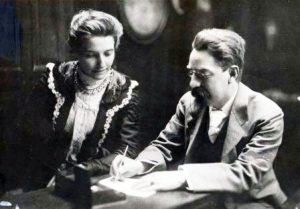
Beatrice & Sidney Webb
Meanwhile, some intellectuals from the USA and Britain – including Labour stalwarts George Bernard Shaw and Sidney and Beatrice Webb – visited the Soviet Union brought back glowing accounts of an expanding economy and a joyful population. (The Soviet propagandists explained away disasters such as the Ukranian Famine as resulting from sabotage by rich peasants or foreign agents.)
With the crisis of capitalism, the rise of fascism and the apparent success of Soviet Russia, many British and American radicals became Communists or fellow travellers. For them, liberalism and the defence of the market economy seemed a weak or unviable option.
The choice seemed to be between two forms of authoritarian government: much better the one that proclaimed equality and opposed racism. (But in reality, the Stalin regime promoted antisemitism, genocide against several other ethnic minorities, and dramatic internal inequalities of power.)
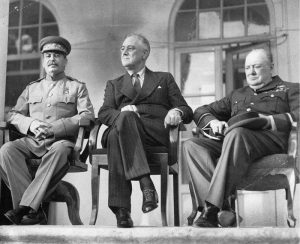
Stalin, Roosevelt and Churchill in 1941
The alliance between Russia and the West in the Second World War smothered criticism of what was really going on within Stalin’s regime. But, with the beginning of the Cold War in 1948, socialists were forced to make a choice between either supporting an antagonistic and undemocratic foreign power, or aligning with the USA and its allied democracies.
Labour under Clement Attlee aligned with the West. But rose-tinted visions of Soviet Russia or (from 1949) Mao’s China lived on among he Left.
In major European democracies, the thirty years between the end of the First World War and the start of the Cold War had seen liberalism squeezed, between socialism on the one hand, and reactionary authoritarianism on the other.
‘American imperialism’ and the rise of neoliberalism
Things were different in the USA, which polarised between forms of Republican conservatism and Democratic liberalism. But rising tensions in the Cold War, and the eruption of the Vietnam War in the 1960s, made American-style liberalism less attractive for the global Left.
 Marxist-led national liberation movements in Cuba, Indochina and elsewhere kept the collectivist vision alive for the Left around the world. Liberalism was see as the fake ideology of American imperialism and the global bourgeoisie.
Marxist-led national liberation movements in Cuba, Indochina and elsewhere kept the collectivist vision alive for the Left around the world. Liberalism was see as the fake ideology of American imperialism and the global bourgeoisie.
Some have argued that neoliberalism was reborn in the 1970s, when conservatives such as Ronald Reagan and Margaret Thatcher adopted a vision of expanding markets and a contracting state. Although the Left could never agree on what ‘neoliberalism’ meant, they mostly agreed that it was the main enemy.
Much of the Left, throughout the world, had never got rid of its agoraphobia – its fear of markets. Private enterprise and market forces were always and everywhere seen as the problem. Liberals, who defended private property and markets as well as human rights, were mocked as the bourgeois enemy.
Our brave new world
But the global tectonic plates are now shifting abruptly, in an erupting national and international crisis, as big as anything since 1948.
Nationalist leaders strut around the world stage. They stock up their nuclear and conventional arsenals and jostle for geopolitical advantage.
Torture is endorsed. Journalists are threatened or imprisoned. Scientific findings on climate change are denied. Intellectuals and experts are ridiculed. Ignorance and dogma are celebrated. Truth is swamped by lies. Legislation protecting workers and the poor is undone. Minorities are attacked and made scapegoats. Racism is given licence. People suffer discrimination on the basis of their religious or other beliefs. Democratic systems are damaged. Judges and lawyers are treated as traitors. The rule of law is undermined.
In this dangerous new world, it matters less whether that railway is nationalised or whether water distribution is in public ownership. Forms of ownership are always secondary to the actual provision and distribution of vital goods and services. But when our rights and liberties can no longer be taken for granted, questions over forms of ownership move even further down the ranking of priorities.
The ubiquitous, trivialising idea that the Left is defined in terms of public provision, and Right as private provision, is historically recent and a gross reversal of their original meanings. It is also a polarisation of lesser relevance in this world of rising authoritarian nationalism.
Our fundamental rights, our liberty, and the rule of law are now increasingly threatened. Their defence becomes the great struggle of our time.
This lesson is hardest for Americans and Britons, who were spared domestically from the jackboots of twentieth-century despotism. Struggles for British and American national liberty are beyond living memory. We have grown fat and lazy on the fruits of the liberal order. We have taken for granted its institutions and underestimated their fragility. We must repair our vigilance.
The liberal opportunity
For 100 years, for the reasons given above, liberalism has been marginalised. Now is its opportunity – indeed its urgent necessity.
Unlike our grandparents in the crisis-ridden 1930s, we have seen the socialist experiments of the twentieth century and counted their cost at 90 million lives. History and social science have more to teach us. If we wish to learn, we can know more about how markets work. We can understand the informational, organisational and other impediments to comprehensive national planning. We can appreciate why countervailing politico-economic power, based on a strong private sector, are necessary to buttress democracy and resist authoritarianism. The twentieth century has taught us these lessons.
The old Marxist mantra of bourgeoisie versus proletariat is also ungrounded in reality. Instead we have a highly fragmented working class, much of it enduringly aligned with authoritarianism and nationalism. Marxism relies on a quasi-religious and nonsensical belief that the working class – whatever it actually believes or strives for – carries our human destiny.
Class struggle has mattered, but it has never been the main motor of history. What have mattered more have been struggles for power, by individuals, dynasties, nations, religions or ideological movements.

The Storming of the Bastille in 1789
Liberalism was one of those movements. Based on the imperatives of equality and liberty, it matured in the Enlightenment.
Liberalism rose up in the English Civil War of the 1640s, in the American Revolution of the 1770s, and in the French Revolution of 1789, in titanic struggles against despotism and oppression.
Now, once again, liberalism is centre stage, as the enemy of authoritarian nationalism.
The liberal rainbow
Its allies are not those who pander to authoritarianism by eroding civil liberties, or do the spadework of the nationalist Right by making immigration (rather than assimilation) a foremost problem. The prime allies of liberalism are all those who defend liberty and human rights. But therein lies a concern, which must be discussed.
From the beginning, liberalism has harboured different views on the role of the state and of the degree of state intervention required in the economy and society. On the one hand there are liberals – sometimes called libertarians – who wish to minimise the role of the state.

Thomas Paine
John Maynard Keynes – another great liberal – argued that state regulation of financial markets and counter-cyclical expenditures are necessary to stabilise the capitalist system. Keynes showed that economic austerity is a flawed doctrine. Government deficits are best reduced by growth: budget cuts can contract the entire economy and make the problem worse.
There is a spectrum of views between individualist and social-democratic liberalism, but all liberals are united in their defence of individual liberty, human rights and political democracy. The diverse colouring of this rainbow does not diminish its united opposition to the dark intolerance and division that is exacerbated by authoritarian nationalism.
The struggle for liberty and equality has always been vital. But many twentieth-century radicals were diverted by the delusions of socialism. The renewed rise of authoritarianism has shown us again that liberalism is the vital political movement of the modern age.
28 January 2017
Minor edits: 29 January, 1, 16 May 2017
|
This book by G. M. Hodgson elaborates on some of the political issues raised in this blog:
Wrong Turnings: How the Left Got Lost
Published by University of Chicago Press in January 2018
|
Bibliography
Allett, John (1981) New Liberalism: The Political Economy of J. A. Hobson (Toronto: University of Toronto Press).
Beveridge, William (1944) Full Employment in a Free Society (London: Constable).
Clarke, Peter (1978) Liberals and Social Democrats (Cambridge: Cambridge University Press).
Claeys, Gregory (1989) Thomas Paine: Social and Political Thought (London and New York: Routledge).
Courtois, Stéphane, Werth, Nicolas, Panné, Jean-Louis, Packowski, Andrzej, Bartošek, and Margolin, Jean-Louis (1999) The Black Book of Communism: Crimes, Terror, Repression (Cambridge MA: Harvard University Press).
Hodgson, Geoffrey M. (2015) Conceptualizing Capitalism: Institutions, Evolution, Future (Chicago: University of Chicago Press).
Hodgson, Geoffrey M. (2017) Wrong Turnings: How the Left Got Lost (Chicago: University of Chicago Press, forthcoming).
Keane, John (1995) Tom Paine: A Political Life (London: Bloomsbury).
Keynes, John Maynard (1936) The General Theory of Employment, Interest and Money (London: Macmillan).
McCloskey, Deirdre Nansen (2017) ‘Nationalism and Socialism Are Very Bad Ideas: But liberalism is a good one’, Reason.Com, February. http://reason.com/archives/2017/01/26/three-big-ideas
Monbiot, George (2016) ‘Neoliberalism – the ideology at the root of all our problems’, The Guardian, 15 April. https://www.theguardian.com/books/2016/apr/15/neoliberalism-ideology-problem-george-monbiot.
Townshend, Jules (1990) J. A. Hobson (Manchester: Manchester University Press).
Venugopal, Rajesh (2015) ‘Neoliberalism as a Concept’, Economy and Society, 44(2), pp. 165-87. http://www.tandfonline.com/doi/abs/10.1080/03085147.2015.1013356.
Posted in Brexit, Common ownership, Democracy, Donald Trump, Immigration, Karl Marx, Labour Party, Left politics, Liberalism, Markets, Nationalization, Politics, Populism, Private enterprise, Right politics, Socialism
November 18th, 2016 by geoffhodgson1946

Geoffrey M. Hodgson
“One of the most important essays you will read in 2016” @Rokewood
What caused the election of Donald Trump? I am deeply dissatisfied by some of the quick answers to this question.
The leader of Her Majesty’s Opposition had an instant answer. Jeremy Corbyn blamed the left’s association “with the forces of globalisation during the Obama administration”. Instead, he insisted, we need to reject “that free market, economic thinking, which processed deindustrialisation in Britain”.

Naomi Klein
Others used different words on the same “free market” theme. Naomi Klein put it bluntly: “the force most responsible” for Trump’s success was “neoliberalism”. This worldview, “fully embodied by Hillary Clinton and her machine”, was “no match for Trump-style extremism.”
Trump won over US voters because: “Under neoliberal policies of deregulation, privatisation, austerity and corporate trade, their living standards have declined precipitously.”
The Guardian columnist George Monbiot followed with a historical piece, claiming that “the events that led to Donald Trump’s election started in England in 1975”, when Margaret Thatcher embraced the free-market “neoliberal” philosophy of Friedrich Hayek. This was a harbinger of the global rise of free-market thinking that allegedly wrought havoc in recent years.
Both Klein and Monbiot argue that Trump capitalised on the failure of other politicians to deal with the adverse effects of neoliberalism.
There is no doubt that the global expansion of capitalism in recent decades has been hugely disruptive, shifting millions of manufacturing jobs to East Asia. In the absence of adequate retraining and investment, it has led to declining opportunities for large swathes of the working population in North America and Europe.
Trump tapped into working class discontent. In important respects his policies are not neoliberal, by any reasonable definition of that term. In his campaign, Trump used anti-neoliberal, protectionist slogans such as high import tariffs and closed borders.

George Monbiot
But why did it take so long for people to react to “neoliberalism” and vote in this way? As Monbiot argued, the current so-called “neoliberalism” got under way in the 1970s. It accelerated after the beginning of economic reform in China in 1978 and after the fall of the Berlin Wall in1989. The whole world was then opened up for trade.
But while right-populist movements had emerged, they were then far from power. Tony Blair won a landslide election in 1997 and increased public spending on welfare, education and health. Three years after Blair had won a third election, the United States elected its first black President.
If neoliberalism and stagnant living standards had been around since the 1970s, then why did it take 40 years for a Trump-like demagogue to be elected? The political wind swung decisively to the right more recently, after the Great Crash of 2008.
But it is also difficult to explain Trump’s populist success as a targeted reaction to the financial crash. The removal of some banking regulations, by Bill Clinton in the US and Gordon Brown in the UK, did exacerbate the lending boom that led to the crash of 2008.
Yet, despite his protectionism, Trump offers still more deregulation. He is not targeting the bankers as part of the “elite”. On the contrary, he has pledged to repeal the Dodd-Frank Act, which was designed to curb some of the excesses of the financial sector. As Larry Elliott put it: “This looks curious for someone trying to surf a tidal wave of populist anger against the bankers.”
 Putting the blame on “neoliberalism” underestimates the way in which outsiders such as Trump and Farage have created populist movements that blame “the elite” and offer simplistic solutions, such as to “curb immigration”. Blaming “neoliberalism” underestimates the pernicious influences of racism and anti-Muslim prejudice. Simplistic economic explanations of Trump’s victory ignore much stronger evidence of other factors at work.
Putting the blame on “neoliberalism” underestimates the way in which outsiders such as Trump and Farage have created populist movements that blame “the elite” and offer simplistic solutions, such as to “curb immigration”. Blaming “neoliberalism” underestimates the pernicious influences of racism and anti-Muslim prejudice. Simplistic economic explanations of Trump’s victory ignore much stronger evidence of other factors at work.
The Pavlovian leftist response of blaming markets or “neoliberalism” for “all our problems” is far off the mark.
What is neoliberalism?
Monbiot is keen to identify “neoliberals” such as Hayek as the villains. According to Monbiot:
“Neoliberalism sees competition as the defining characteristic of human relations. … Tax and regulation should be minimised, public services should be privatised. The organisation of labour and collective bargaining by trade unions are portrayed as market distortions that impede the formation of a natural hierarchy of winners and losers. Inequality is recast as virtuous: a reward for utility and a generator of wealth, which trickles down to enrich everyone.”
I shall pass over the many flaws in the essay from which the above passage is quoted. Monbiot conflates the different views of Ludwig von Mises, Friedrich Hayek and Milton Friedman, and he is inaccurate on several details. Note also that Monbiot does not highlight deregulation of the financial sector in this passage.
After taking on board Monbiot’s definition of neoliberalism, let us consider the extent to which it has been achieved in the real world.
Has neoliberalism been achieved in practice?
Monbiot described how in the 1970s “elements of neoliberalism, especially its prescriptions for monetary policy, were adopted by Jimmy Carter’s administration in the US and Jim Callaghan’s government in Britain.” He is unclear on the details, but presumably in part he refers to Callaghan’s embrace of monetarist ideas from 1976 to 1979.

Milton Friedman
Monetarism, incidentally, is not obviously the same as neoliberalism. While monetarists such as Friedman were free-marketeers, monetarism’s central claim is that the main cause of inflation is the rise in the money supply – a thesis that (as Friedman himself recognised) could also apply to a planned economy. Indeed, this central monetarist tenet was adopted by some Marxist economists.
“After Margaret Thatcher and Ronald Reagan took power, the rest of the [neoliberal] package soon followed: massive tax cuts for the rich, the crushing of trade unions, deregulation, privatisation, outsourcing and competition in public services.”
He is right. Albeit to different degrees in different countries, these things happened.
But go back to Monbiot’s checklist definition of neoliberalism, as quoted above. He saw neoliberalism as minimising “tax” not simply “tax cuts for the rich”. Has this happened?
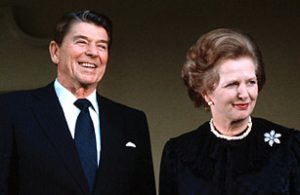
Ronald Reagan & Margaret Thatcher
Margaret Thatcher reduced taxation for the rich. But the overall tax burden (all taxes as a percentage of GDP) rose during her period of office. This figure fell in the 1990s and has fluctuated from 1997 in a range between 35 per cent and 38 per cent of GDP. The UK austerity governments since 2010 have not reduced the overall tax take significantly.
Similarly, Ronald Reagan began by cutting income taxes for the rich, but ended his eight-year term of office with a Federal percentage tax take almost identical to that of his predecessor Jimmy Carter, and slightly above the average for the entire 1970-2009 period.
The “neoliberal” mission of massive overall tax cuts was not achieved under Thatcher or Reagan, or under subsequent administrations. Put in a longer historical perspective, taxation and public spending in the UK and USA today are much higher than they were before the Second World War.
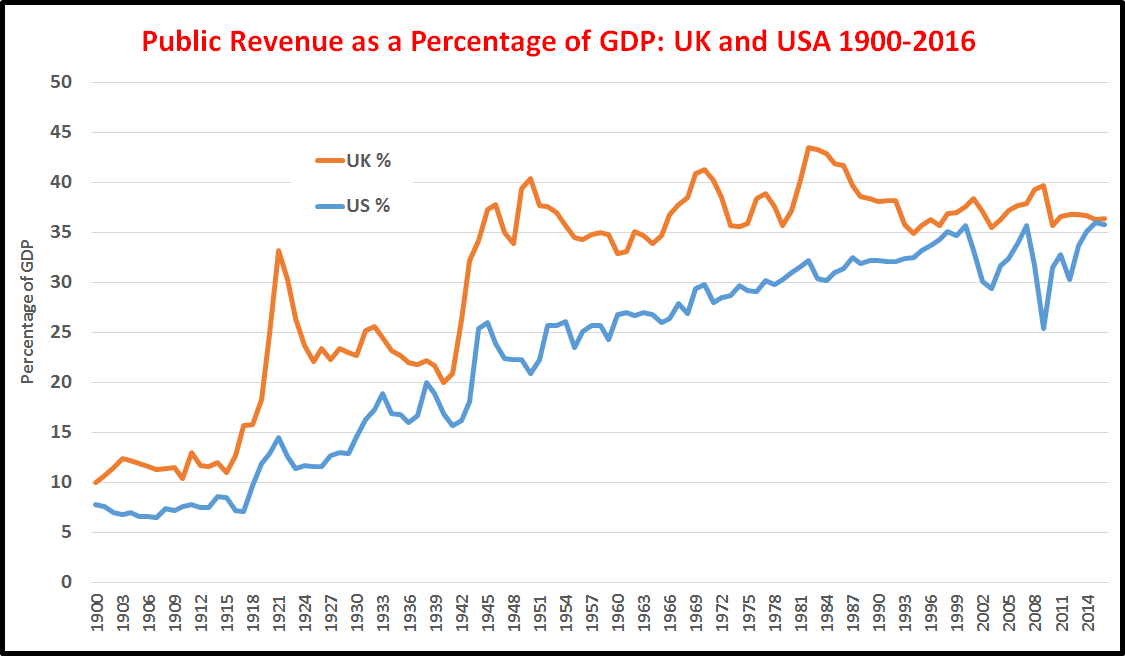
The above figure shows the tax revenues, from national, state and local government combined, for the UK and the USA from 1900 to 2016. The alleged era of “neoliberalism” from the 1970s has not been associated with declining tax revenues. If anything, the “neoliberal” era of a minimal state was pre 1914, not post-1975.
What is characteristic of fiscal policy in the UK and USA is not the alleged “neoliberal” overall reduction of taxation but a lightening of taxation on the rich, and a failure to redistribute sufficiently, in the face of widening inequality.
Klein is probably right to suggest: “A good chunk of Trump’s support could be peeled away if there were a genuine redistributive agenda on the table.” But she, with Corbyn and Monbiot, are wrong to chime in with the crude anti-market mantras that have disabled the Left for 180 years. In building a redistributive agenda we must look to Thomas Paine, rather than Robert Owen or Karl Marx.
Privatisation: against dogma
By contrast, Monbiot’s other point, about growing privatisation since the 1970s, has been borne out by the evidence. In the UK, USA and much of the world there has been massive privatisation and outsourcing of public services.
 Unlike any false claim that “neoliberalism” has reduced overall taxes, the increase of privatisation is manifest. In addition, it has sometimes led to deleterious consequences including lower pay for workers and a reduced quality of services.
Unlike any false claim that “neoliberalism” has reduced overall taxes, the increase of privatisation is manifest. In addition, it has sometimes led to deleterious consequences including lower pay for workers and a reduced quality of services.
But Corbyn and Monbiot speak and write as if privatisation is necessarily bad – always and everywhere it is seen as a negative policy. This doctrinaire stance simply inverts the claim of the crudest free marketeers, who claim that state provision is always bad and that private provision is always good. The Corbyn-Monbiot stance simply turns this upside-down. It is equally dogmatic. It is based on ideology, not evidence.
Regarding markets as always bad, amounts to agoraphobia or fear of markets (from the Greek words agora for market, and phobia for fear). This is an inversion of the kratophobia of the free-marketeers – a fear of government or of the state.
Instead of these ideologically-driven, simplistic positions, it is necessary to be more pragmatic. Some privatisations work. Others do not. Some state provision is effective. Some is wasteful and inefficient. We need to look at individual cases to understand why.
There are many case studies to look at and they are too wide-ranging to be reviewed here. A good start would be to look at an important early article on privatisation by John Goodman and Gary Loveman in the Harvard Business Review. They wrote:
“the issue is not simply whether ownership is private or public. Rather, the key question is under what conditions will managers be more likely to act in the public’s interest … managerial accountability to the public’s interest is what counts most, not the form of ownership.”
Goodman and Loveman argued that profits and the public interest overlap best when the privatised organisation is in a competitive market. Competition from other companies can discipline managerial behaviour. Consequently, there is little point in privatisation if competition is lacking.
Subsequent research has shown that other factors are involved as well. Instead of being driven by dogma, we need to be pragmatic and experimental, taking account of research.
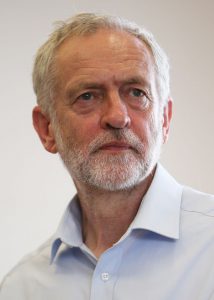
Jeremy Corbyn
You may respond that Corbyn is pragmatic, because he has declared that he is in favour of a mixed economy: he accepts a private as well as a public sector. But notice the imbalance in his presentations. He treats public provision as ideal, and the private sector as an expedient to be tolerated, at least for a while.
Corbyn says he accepts a mixed economy, but he has offered has no defence of private sector. His “mixed economy” could be a stopping point on the road to a fully-socialist planned economy, where private enterprise is pushed to the side-lines.
Declining public provision?
 Ken Loach’s moving film, I, Daniel Blake, portrays the heart-breaking human consequences of the UK Conservative government’s shredding of the welfare safety net for the poor. Attempts to reduce public spending in many countries have led to millions of human tragedies like this.
Ken Loach’s moving film, I, Daniel Blake, portrays the heart-breaking human consequences of the UK Conservative government’s shredding of the welfare safety net for the poor. Attempts to reduce public spending in many countries have led to millions of human tragedies like this.
Doctrinaire austerity policies – which fail in their own terms because they depress economic demand for goods and services and create more unemployment – have been adopted by many governments and imposed by the European Union.
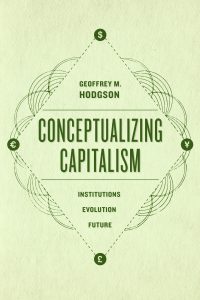 All this is real, and tragic. Millions have suffered because of such misguided policies. But we should not jump to the conclusion that “neoliberalism” has been successful in moving toward a minimal economic role for the state.
All this is real, and tragic. Millions have suffered because of such misguided policies. But we should not jump to the conclusion that “neoliberalism” has been successful in moving toward a minimal economic role for the state.
In my book Conceptualizing Capitalism I examined differences and changes in public social spending in different developed countries from 1980 to 2005, using OECD data. The principal components of public social spending include health services, old age benefits, unemployment benefits, incapacity-related benefits, family support, active labour market public programs, and housing benefits.
Amounts of public spending as percentages of GDP (in 1980 and 2005) are shown below.
|
1980 |
2005 |
change |
| Australia |
10.3 |
16.5 |
+6.2 |
| Austria |
22.4 |
27.1 |
+4.7 |
| Belgium |
23.5 |
26.5 |
+3.0 |
| Canada |
13.7 |
16.9 |
+3.2 |
| Denmark |
24.8 |
27.7 |
+2.9 |
| Finland |
18.1 |
26.2 |
+8.1 |
| France |
20.8 |
30.1 |
+9.3 |
| Germany |
22.1 |
27.3 |
+5.2 |
| Italy |
18.0 |
24.9 |
+6.9 |
| Japan |
10.2 |
18.5 |
+8.3 |
| Netherlands |
24.8 |
20.7 |
–4.1 |
| Norway |
16.9 |
21.6 |
+4.7 |
| Portugal |
9.9 |
23.0 |
+13.1 |
| Spain |
15.5 |
21.1 |
+5.6 |
| Sweden |
27.1 |
29.1 |
+2.0 |
| Switzerland |
13.8 |
20.2 |
+6.4 |
| UK |
16.5 |
20.5 |
+4.0 |
| US |
13.2 |
16.0 |
+2.8 |
Public Social Spending as Percentage of GDP in Selected Countries
Most countries increased their public social spending, during a period when the ideology of privatization was resurgent. The Netherlands is an exception. Note that the increases in public social spending are not explained by rises in unemployment benefit, because generally this comprises a small proportion of public social spending.
Of course, it needs to be emphasised that there is an ideologically-driven agenda that has led to deep cuts in some welfare and has been gravely damaging for the poor. But we are far from re-entering the era of the minimal state.
Pursuing unicorns
Much of the hysteria against “neoliberalism” draws from the Left’s deep rooted antipathy to markets. Let’s briefly address this.
First, they may be alternatives to markets in modern, large-scale economic systems but they would greatly out-do the miseries inflicted on the fictional Daniel Blake and his millions of real-world counterparts.
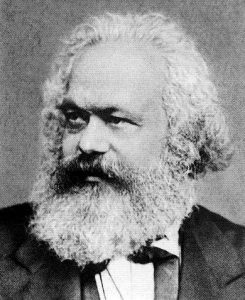
Karl Marx
Every attempt to get rid of markets, since Robert Owen and Karl Marx proclaimed their redundancy in the nineteenth century, has led to famine, repression and the termination of democracy. Look to Stalin’s Russia, Mao’s China, Cambodia, Cuba and Venezuela. Twentieth-century Communism resulted in over 90 million deaths.
In the light of twentieth-century experience it would be worse than foolhardy to make yet another attempt to minimise markets, or as Klein oddly put it, “corporate trade”.
A better way is possible, but it involves taming and supplementing markets, not repressing them. It means regulating corporations, not casting them as sorcerers of evil. But sadly, agoraphobia still afflicts many on the left.
“It seems to me that the questions we urgently need to ask ourselves are these: is totalitarianism the only means of eliminating capitalism? If so, and if … we abhor totalitarianism, can we continue to call ourselves anti-capitalists? If there is no humane and democratic answer to the question of what a world without capitalism would look like, then should we not abandon the pursuit of unicorns, and concentrate on capturing and taming the beast whose den we already inhabit?”
Excellent. But since then he has gone down the rocky road of blaming “neoliberalism” for “all our problems”. Without defending some role for private property or markets, he thereby allies himself with the many leftists who now describe anyone defending private property or markets as “neoliberal”.
Has Monbiot now abandoned the idea of taming the capitalist beast? Does he wish to kill it instead?
In April 2016 he wrote: “Every invocation of Lord Keynes is an admission of failure.” So he junked the best macroeconomic theory we have for limiting some of the excesses of capitalism. His grounds for doing so were these:
“Keynesianism works by stimulating consumer demand to promote economic growth. Consumer demand and economic growth are the motors of environmental destruction.”
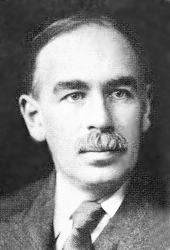
John Maynard Keynes
Wrong. “Consumer demand and economic growth” can destroy the planet, but only if that demand and growth relate to non-renewable material resources. Much demand and growth in modern economies is for services. Intangible assets now make up much of corporate wealth. For example, there are demands for information and education, and such services are added to GDP. There is no necessary reason why economic growth in a modern information-rich economy should ruin the planet. Keynes is still relevant.
Those that have pursued unicorns have imagined that it is possible to design a better system than capitalism. Monbiot says the same, declaring that for the Left
“the central task should be to develop an economic Apollo programme, a conscious attempt to design a new system, tailored to the demands of the 21st century.”
This puts him in full, unicorn-chasing mode. One of the biggest mistakes by early socialists was to ignore the massive complexity of modern economic systems and attempt to “design a new system” at the behest of some utopian dreamer.
Instead, what is required is careful, incremental, experimental change, retaining the flexibility and devolved autonomy afforded by widespread private property. This autonomy allows for multiple experiments and deeper learning from mistakes.
While state intervention is necessary, no complete or adequate overall “design” is possible, because of the way much knowledge is irretrievably dispersed throughout the economy. The economies of the twenty-first century are more knowledge-intensive than those before. Hence the possibilities of comprehensive central planning or “design” are even more limited.
Neoliberalism and economic man
“as modern psychology and neuroscience make abundantly clear – human beings, by comparison with any other animals, are both remarkably social and remarkably unselfish. The atomisation and self-interested behaviour neoliberalism promotes run counter to much of what comprises human nature.”
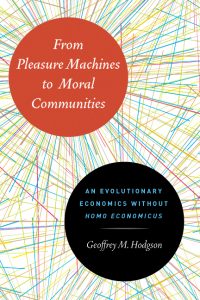 The first sentence is valid and important. The second is simplistic. As I elaborate in my book From Pleasure Machines to Moral Communities, strong evidence from psychology, evolutionary biology and primatology shows that the picture of self-seeking “economic man”, which dominated mainstream economics until recently, is deeply flawed.
The first sentence is valid and important. The second is simplistic. As I elaborate in my book From Pleasure Machines to Moral Communities, strong evidence from psychology, evolutionary biology and primatology shows that the picture of self-seeking “economic man”, which dominated mainstream economics until recently, is deeply flawed.
But that does not mean that we can or should get rid of markets. Our capacities for cooperation evolved culturally and genetically because our ancestors hunted and foraged in groups, rarely numbering more than 200 individuals, for millions of years. Relying on emotions and facial expressions, we developed sophisticated social mechanisms to engender trust and cooperation, and to enforce social rules.
As larger-scale cities emerged about 14,000 years ago, these face-to-face mechanisms could no longer be relied upon exclusively to regulate social interactions. Institutions such as law, property and contract were developed to deal with these more impersonal, non-familial, transactions.
Every human civilisation that has developed has relied on property, trade and contracts. These require different enforcement mechanisms, but they too require measures of trust and moral obligation, as Adam Smith made clear in his Theory of Moral Sentiments. The idea that markets inevitably corrode away all social ties is mistaken.
Even the Soviet-style economies of the twentieth century relied on some private property and trade. They failed because state bureaucracy stifled autonomy and innovation. China grew rapidly when it expanded the private sector after 1978.
Of course, the spread of the market would be detrimental if it invaded all our social relations, attempting to put prices on love and friendship and reducing everything else to money transactions. But a system of private property provides a degree of autonomy that is required to maintain non-market interactions at home and at work. Successful corporations create islands of cooperation and teamwork within their organisational boundaries.
 Impersonal relations occur in bureaucracies as well as in markets. Large-scale systems of national planning also make much interaction impersonal. People become atomised; they become numbers, to be processed by bureaucrats and computers.
Impersonal relations occur in bureaucracies as well as in markets. Large-scale systems of national planning also make much interaction impersonal. People become atomised; they become numbers, to be processed by bureaucrats and computers.
The experience of centrally-planned economies in Russia, China and Eastern Europe shows that systems of state planning can be cesspits of human alienation and corruption, governed impersonally by disillusioned bureaucrats and corrupt state officials. I recommend the film The Lives of Others for a glimpse into that dark world.
Abandoning neoliberalism
I have written at further length elsewhere on the limits to markets. I accept Hayek’s explanation that comprehensive overall planning is dysfunctional. But I do not accept that everything should or can become a monetary transaction in its place.
Indeed, the growing use of information in a capitalist economy puts limits on the role of information as property. Furthermore, the very freedom of waged employees means that there are constraints on entering into contracts for future work. There are limited futures markets for labour. For such reasons, capitalism can never be a 100 per cent market system.
Hayek failed to acknowledge fully the limits to markets. Such free marketeers are the mirror-image of socialists who fail to acknowledge adequately that there are limits to common ownership. We have to transcend both agoraphobia and kratophobia.
Agoraphobics react adversely to any tolerance of markets. Hence economic interventionists such as Tony Blair, and supporters of public healthcare such as Hillary Clinton, have recently and frequently been accused of being neoliberals. This is misleading and absurd.
As Colin Talbot has pointed out, “neoliberalism” has become “a term of abuse” to be used against “any type of pro-market reform or political position that recognizes markets may – in the right circumstances – be a good thing”. Consequently, everyone “from moderate social democrats to the most lurid free-marketeers gets lumped together under a convenient ‘neoliberal’ label.”
In a brilliant survey of its usage since the 1980s, Rajesh Venugopal concluded that “neoliberalism has become a deeply problematic and incoherent term that has multiple and contradictory meanings, and thus has diminished analytical value.”
Some may wish to retain the “neoliberal” label, to apply it to those free marketeers who attempt to shrink radically the size of the state, and to privatise anything that walks. The definition could be further sharpened by adding advocacy of economic austerity. It could also could be sharpened by including deregulation of the financial sector.
 But such nuances have been lost in a global storm of “neoliberal” accusations. Klein and Monbiot have added some force and authority to this widening tempest.
But such nuances have been lost in a global storm of “neoliberal” accusations. Klein and Monbiot have added some force and authority to this widening tempest.
They do not confine their accusations to the likes of Hayek. Most seriously, they pointed the “neoliberal” finger at Hillary and Bill Clinton, as Corbyn made the “forces of globalisation” jibe at Barack Obama.
If it means anything, neoliberalism is an ideology and only partly a reality. Austerity and welfare cuts have wreaked havoc, but markets and private enterprise have lifted millions out of poverty. Agoraphobic accusations of “neoliberalism” miss the latter point.
“Neoliberalism” gave us Trump
We may ask: what part did the accusers of “neoliberalism” have to play in Trump’s victory? The constant tainting of Hillary Clinton as a “neoliberal” may have helped to persuade many Democratic supporters to stay at home. We know from the data that the below-par turnout by Democrats – especially by the young – was decisive in losing those swing states.
Tainting Hillary Clinton as a “neoliberal” could have played a part in clinching Trump’s success. If so, “neoliberalism” gave us Trump, but not in the way that Klein and Monbiot suggest.
18 November 2016
Minor edits – 19, 25, 30 November, 15, 28 December 2016
|
My forthcoming book elaborates on some of the political issues raised in this blog:
Wrong Turnings: How the Left Got Lost
To be published by University of Chicago Press in November 2017
|
Bibliography
BBC News (2016) ‘Jeremy Corbyn outlines Labour’s vision of a “new economics”’, 21 May. http://www.bbc.com/news/uk-politics-36351149.
Chantrill, Chrisopher (2016a) ‘UK Public Revenue’. http://www.ukpublicrevenue.co.uk/uk_national_revenue_analysis
Chantrill, Chrisopher (2016b) ‘US Government Revenue’. http://www.usgovernmentrevenue.com/revenue_history
Elgot, Jessica (2016) ‘Corbyn backs reduction of NATO presence along Russia’s borders’, The Guardian, 13 November. https://www.theguardian.com/politics/2016/nov/13/jeremy-corbyn-hints-at-reducing-nato-presence-russia-putin?CMP=share_btn_tw.
Elliott, Larry (2016) ‘Trump’s economic view is far from neoliberal, but it rides a populist wave’, The Guardian, 31 July. https://www.theguardian.com/business/2016/jul/31/trumps-economic-view-is-far-from-neoliberal-but-it-rides-a-populist-wave.
Goodman, John B. and Loveman, Gary W. (1991) ‘Does privatization serve the public interest?’ Harvard Business Review, November-December. https://hbr.org/1991/11/does-privatization-serve-the-public-interest.
Hodgson, Geoffrey M. (2013) From Pleasure Machines to Moral Communities: An Evolutionary Economics without Homo Economicus (Chicago: University of Chicago Press).
Hodgson, Geoffrey M. (2015) Conceptualizing Capitalism: Institutions, Evolution, Future (Chicago: University of Chicago Press).
Hodgson, Geoffrey M. (2017) Wrong Turnings: How the Left Got Lost (Chicago: University of Chicago Press, forthcoming).
Johnson, Christopher (1991) The Economy under Mrs Thatcher (Harmondsworth: Penguin).
Klein, Naomi (2016) ‘It was the Democrat’s embrace of neoliberalism that won it for Trump’, The Guardian, 9 November. https://www.theguardian.com/commentisfree/2016/nov/09/rise-of-the-davos-class-sealed-americas-fate.
Monbiot, George (2003) ‘Rattling the Bars’, The Guardian, 18 November. See http://www.monbiot.com/2003/11/18/rattling-the-bars/.
Monbiot, George (2016a) ‘Neoliberalism – the ideology at the root of all our problems’, The Guardian, 15 April. https://www.theguardian.com/books/2016/apr/15/neoliberalism-ideology-problem-george-monbiot.
Monbiot, George (2016b) ‘Neoliberalism: the deep story that lies beneath Donald Trump’s triumph’, The Guardian, 14 November. https://www.theguardian.com/commentisfree/2016/nov/14/neoliberalsim-donald-trump-george-monbiot.
O’Hara, Glen (2016) ‘Stop saying that Trumpism is about economics’, 15 November. http://publicpolicypast.blogspot.co.za/2016/11/stop-saying-that-trumpism-is-about.html.
Pagano, Ugo (2014) ‘The Crisis of Intellectual Monopoly Capitalism’, Cambridge Journal of Economics, 38(6), November, pp. 1409-29. http://cje.oxfordjournals.org/content/early/2014/08/04/cje.beu025.
Sahadi, Jeanne (2010) ‘Taxes: What people forget about Reagan’, CNN Money, 12 September. http://money.cnn.com/2010/09/08/news/economy/reagan_years_taxes/.
Talbot, Colin (2016) ‘The myth of neoliberalism’, 31 August. https://colinrtalbot.wordpress.com/2016/08/31/the-myth-of-neoliberalism/.
Velasco, Andrès (2016) ‘The Real Roots of Populism’, Project Syndicate, 28 July. https://www.project-syndicate.org/commentary/real-roots-of-populism-by-andres-velasco-2016-07?backaction=
Venugopal, Rajesh (2015) ‘Neoliberalism as a Concept’, Economy and Society, 44(2), pp. 165-87. http://www.tandfonline.com/doi/abs/10.1080/03085147.2015.1013356.
Posted in Common ownership, Donald Trump, George Monbiot, Jeremy Corbyn, Karl Marx, Left politics, Liberalism, Markets, Naomi Klein, Nationalization, Populism, Private enterprise, Right politics, Tony Blair, Uncategorized
August 16th, 2016 by geoffhodgson1946
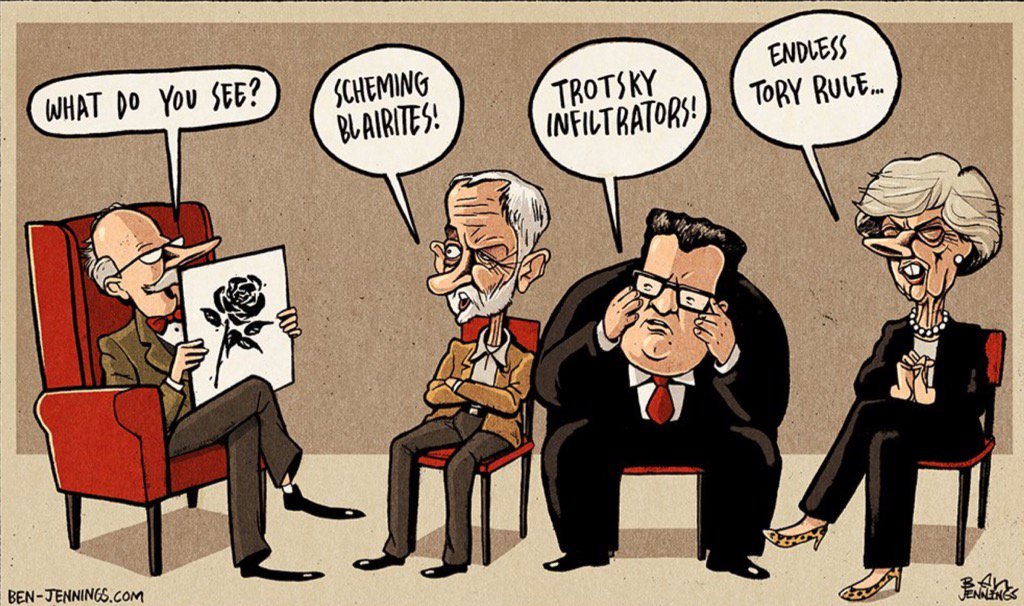
Geoffrey M. Hodgson
“This, from the always measured g. m. hodgson, shows Labour’s existential crisis in horrifying detail” – Susan Wilde
“The revolutionary road: excellent sober distillation of Marxism/Leninism/Trotskyism/socialism; rights v insurrection” – Rich Greenhill
“A very good summary of Labour and Trotskyism” – Gerry Hassan
“Another fantastic article!” – Lily Jayne Summers
John McDonnell, the Labour Shadow Chancellor, is an admirer of Trotsky. Corbyn once called upon the USSR to rehabilitate the Russian revolutionary.2
 Trotskyists are socialists who believe in the common ownership of the means of production. This goal was stated in Labour’s Clause Four from 1918 to 1995, so why shouldn’t Trotskyists be allowed to join Labour?
Trotskyists are socialists who believe in the common ownership of the means of production. This goal was stated in Labour’s Clause Four from 1918 to 1995, so why shouldn’t Trotskyists be allowed to join Labour?
Trotskyists differ from the devotees of Mao Zedong or Joseph Stalin. Trotskyists do not describe the murderous regimes of Mao’s China and the USSR as socialist. They promote themselves as anti-totalitarian, and they might seem much more democratic than other Marxists.
So why shouldn’t Trotskyists be allowed to join Labour?
The Parliamentary versus the Revolutionary Road
There is a prominent negative answer to this question. It raises profound differences of strategy. As Neil Kinnock (who did the party a great service by kicking out Militant in 1985) said in a speech to the Parliamentary Labour Party in July 2016:
‘In 1918 in the shadow of the Russian revolution [Labour members decided] … that they would not pursue the revolutionary road – it was a real choice in those days. They would pursue the parliamentary road to socialism.’
According to this view, Labour members and revolutionary Marxists share the same aim – socialism – but they differ on the method of getting there. Labour follows the parliamentary road; Marxists choose the revolutionary road.

Robert Owen
There are big problems with a part of this argument. Socialism was defined by Robert Owen and Karl Marx in terms of common ownership of the means of production and ‘the abolition of private property’.
But at least in practice since 1945, Labour has been less and less devoted to this goal. Finally, the goal of ‘common ownership’ was removed from Clause Four of the Labour Party Constitution in 1995.
Labour now says that it is a ‘democratic socialist’ party but defines this not in terms of common ownership. Instead there is a goal of social solidarity, believing ‘that by the strength of our common endeavour we achieve more than we achieve alone’, and in a society ‘in which power, wealth and opportunity are in the hands of the many not the few’.
Arguably, such a goal might be achievable in a reformed capitalism. But Trotskyists, like all Marxists, are emphatically against capitalism.
What Trotskyists and the post-1995 Labour Party Constitution mean by ‘socialism’ are very different. The divergences between Labour and Trotskyists concern different ends, as well as different means.
But Corbyn’s election as Leader by over 59 per cent of the membership in 2015 shows that the traditional definition and goal of socialism in the Labour Party is far from dead and buried. Under Corbyn’s leadership, Labour could return to its pre-1995 goals.

Tony Blair
Ironically, by getting rid of the traditional ‘common ownership’ version of socialism in 1995, but retaining the word ‘socialism’ in an attempt to invest it with a different meaning, Tony Blair provided legitimacy for any later attempt by classical socialists – including currently by Trotskyists and Corbynistas – to restore Labour to its original colours.
Within Labour today, because of this legacy, everyone from Trotskyists and Corbynistas at one extreme, through Owen Smith, Neil Kinnock and then on to Tony Blair at the other extreme, is obliged to call themselves a ‘socialist’. But there are massive silences and huge disagreements on its meaning.
Labour becomes less capable of discussing fundamental differences of goal, but clings onto the illusion of the fundamental goodness of something called ‘socialism’. Labour’s problem of entryism will never go away while the s-word continues to cast its spell. The word itself is an invitation for those who propose the common ownership of anything to join.
The Totalitarian Politics of Class Struggle
There are other fundamental problems with Marxism in general, and Trotskyism in particular. First, Marxism rejects the supreme values of the Enlightenment.
For example, Frederick Engels in Socialism: Utopian and Scientific, saw these Enlightenment values as ‘nothing more than the idealized kingdom of the bourgeoisie’ with its ‘bourgeois justice’, its ‘bourgeois equality before the law’ and ‘bourgeois property … proclaimed as one of the essential rights of man’.
 Marxists do not see the French Revolutionary principles of liberty, equality and fraternity as a potential achievement for all, but the rhetoric of the rising capitalist class in the class struggle against the old feudal order.
Marxists do not see the French Revolutionary principles of liberty, equality and fraternity as a potential achievement for all, but the rhetoric of the rising capitalist class in the class struggle against the old feudal order.
After playing their progressive historic role, Enlightenment ideas are seen as ‘bourgeois’ ideology, which now serves to repress the working class.
Marx saw socialism as the class destiny of the proletariat, which by overthrowing capitalism would emancipate humankind from inequality and exploitation. Socialism was not validated by an appeal to justice or rights. Instead it was grounded on ‘material’ and ‘economic’ developments within capitalism that were leading to growing internal crises and the rise of the proletariat.
Marx rejected all appeals to rights or justice. He bypassed the issues of morality and justice by focusing on the real social forces allegedly leading to socialism. But neither the driving forces of history nor the supposed destiny of a social class make this socialist future just, or morally right.

Karl Marx
By shelving the discourse on rights, in favour of the scientifically-clothed rhetoric of proletarian destiny, all versions of Marxism – including Trotskyism – are on the slippery slope toward totalitarianism.
When rights are no longer universal, and no-one has the protection of an independent legal system, the any action that is deemed ‘counter-revolutionary’ or ‘against the interests of the working class’ gives the accused no effective defence. The prosecutors monopolise the interpretation of guilt. Arbitrary punishment can follow.
The rights of critics and dissenters have to be protected, by their formal recognition and the autonomy of the judiciary. Unless this is done, any criticism can be crushed.
Trotsky was wrong: the roots of totalitarianism do not lie principally in the personalities of brutal, power-hungry individuals such as Stalin, but in Marxism itself. As Leszek Kolakowski suggested:
‘Marx’s anticipation of perfect unity of mankind and his mythology of the historically privileged proletarian consciousness … were responsible for his theory being eventually turned into an ideology of the totalitarian movement: not because he conceived of it in such terms, but because its basic values could hardly be materialized otherwise.’
Violence versus Parliament and Law
Laws get in the way of revolutionary struggle. Hence, along with their dilution of the notion of rights, Lenin proposed that all laws should be abolished.
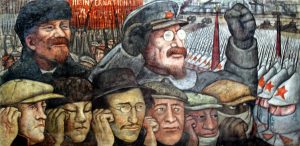 Writing in 1918, Lenin described the desired ‘dictatorship of the proletariat’ as ‘rule based directly upon force and unrestricted by any laws. The revolutionary dictatorship of the proletariat is rule won and maintained by the use of violence by the proletariat against the bourgeoisie, rule that is unrestricted by any laws.’ Trotsky supported Lenin in this and most other respects.
Writing in 1918, Lenin described the desired ‘dictatorship of the proletariat’ as ‘rule based directly upon force and unrestricted by any laws. The revolutionary dictatorship of the proletariat is rule won and maintained by the use of violence by the proletariat against the bourgeoisie, rule that is unrestricted by any laws.’ Trotsky supported Lenin in this and most other respects.
Consequently, a fundamental problem with Marxism is its failure to support the universality of human rights. Human rights apply to all, as in the majestic 1948 United Nations Declaration of Universal Human Rights.
Instead, Marxists see social advancement as a matter of ‘class struggle’ where one class must seize power and remove rights from another class. Lenin and Trotsky went one step further: they argued that this struggle for proletarian power must override the rule of law.
The Second Congress of the Communist International took place in Russia in 1920. Under the leadership of Lenin, one of its resolutions mentioned ‘bourgeois parliaments’ and declared:
‘The task of the proletariat consists in breaking up the bourgeois state machine, destroying it, and with it the parliamentary institutions, be they republican or constitutional monarchy.’
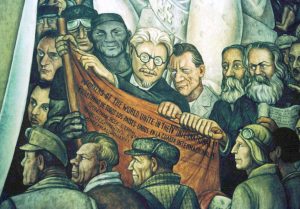 Throughout his life, Trotsky defended the decisions of the first four congresses of the Communist International, which took place when Lenin was alive and before Stalin seized power.
Throughout his life, Trotsky defended the decisions of the first four congresses of the Communist International, which took place when Lenin was alive and before Stalin seized power.
Trotsky added his own idea of ‘permanent revolution’, involving civil war, even in a parliamentary democracy:
‘Socialist construction is conceivable only on the foundation of the class struggle, on a national and international scale. This struggle … must inevitably lead to explosions, that is, internally to civil wars and externally to revolutionary wars. Therein lies the permanent character of the socialist revolution as such, regardless of whether it is a backward country … or an old capitalist country which already has behind it a long epoch of democracy and parliamentarism.’
Conclusion: Hands Tied Behind their Backs
Those in Labour wanting to fight the battle against entryism have two hands tied behind their backs.
 First, by hanging on to the word ‘socialism’, after abandoning its original meaning, it is difficult to exclude those who are more genuinely socialist in the classical sense of common ownership. Labour’s obligatory (but now shallow) rhetoric of ‘socialism’ is a green light for socialist entryists of all kinds.
First, by hanging on to the word ‘socialism’, after abandoning its original meaning, it is difficult to exclude those who are more genuinely socialist in the classical sense of common ownership. Labour’s obligatory (but now shallow) rhetoric of ‘socialism’ is a green light for socialist entryists of all kinds.
Second, Labour has long-ago ditched the politics of class struggle, but it retains a notion of class partisanship in its very name. It was formed historically to represent the interests of the working class. It was built upon the trade union movement. Labour itself is a class party.
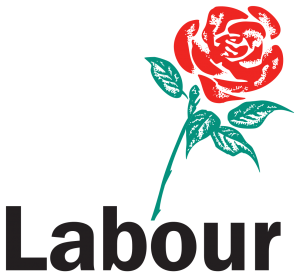 Of course, Labour in practice has put aside the notion that it is speaking for one section of society only. But its name remains a problem, both for broadening its appeal and for barring the more energetic and extreme exponents of working class representation and power.
Of course, Labour in practice has put aside the notion that it is speaking for one section of society only. But its name remains a problem, both for broadening its appeal and for barring the more energetic and extreme exponents of working class representation and power.
Of course, to achieve its goals, Labour is pledged to working through parliament, rather than through revolution. This is a very important difference. Many Marxists are still devoted to insurrection. Labour clearly is not. With this one big foot it can kick back. But its two hands are tied.
Labour still has much outdated baggage to deal with. Even if it staves off Trotskyist entryism – which now seems unlikely, at least while Corbyn is Labour Leader – it still will have a number of big problems. It will need to find and package a new identity for itself, which is suitable for the twenty-first century.
Retaining an unconvincing redefinition of ‘socialism’ and calling itself ‘Labour’ will not do.
Labour needs to come to terms with the fact that both classical socialism and class politics are untenable. It has to put democratic and progressive Enlightenment values at its centre, and reconfigure itself for the challenges of the twenty-first century.
16 August 2016
Minor edits: 17-18 August 2016
Endnotes
- Note that I refrain in this article from estimating the scale or impact of Trotskyist entryism in the Labour Party. They are not central to my argument here. For evidence of both (and of Corbyn’s links with the IRA) see here. At least currently, entryists into Labour are probably few in number, but it is a well-established fact that a few determined people can influence many thousands.
- In 2010, McDonnell attended an event commemorating the 70th anniversary of Trotsky’s assassination and has praised the ‘importance’ of his ideas (Riley-Smith 2016a). In 1988 Corbyn demanded from Parliament that the USSR should ‘give complete rehabilitation to Leon Trotsky’ (Riley-Smith, 2016b). Nothing wrong with that, but its shows the way he leans and who he chooses as friends.
- Personal note: I was a critical and wobbly Trotskyist from 1968 to 1973. I re-joined the Labour Party in 1974 and left it in 2001. The photograph below shows me (not then a Trot) visiting Trotsky’s house in Mexico in 1981, where he was murdered in 1940. It is a moving and impressive place.

References
Crick, Michael (2016) Militant (London: Biteback Publishing), esp. pp. xvii–xviii.
Kolakowski, Leszek (1977) ‘Marxist Roots of Stalinism’, in Robert C. Tucker (ed.) (1977) Stalinism: Essays in Historical Interpretation (New York: Norton), pp. 283-98.
Lenin, Vladimir Ilyich (1967) Selected Works in Three Volumes (London: Lawrence and Wishart), esp. vol. 3, p. 49.
Marx, Karl and Engels, Frederick (1962) Selected Works in Two Volumes (London: Lawrence and Wishart), esp. vol. 2, p. 117.
New Park Publications (1977) The Second Congress of the Communist International, 2 vols (London: New Park), esp. vol. 2, p. 52.
Riley-Smith, Ben (2016a) ‘Labour Entryism Row: John McDonnell Attended Celebration of Leon Trotsky and Praised ‘Importance’ of his Ideas’, The Telegraph, 14 August. http://www.telegraph.co.uk/news/2016/08/14/labour-entryism-row-john-mcdonnell-attended-celebration-of-leon/.
Riley-Smith, Ben (2016b) ‘Jeremy Corbyn Called for a “Complete Rehabilitation” of Leon Trotsky in Parliament’, The Telegraph, 16 August. http://www.telegraph.co.uk/news/2016/08/15/jeremy-corbyn-called-for-complete-rehabilitation-of-leon-trotsky/
Sparrow, Andrew and Jones, Harrison (2016) ‘Secret Recording of Kinnock’s anti-Corbyn Speech to MPs – In Full’, The Guardian, 6 July. http://www.theguardian.com/politics/2016/jul/08/secret-recording-neil-kinnock-jeremy-corbyn-step-down-speech-to-mps-in-full.
Trotsky, Leon D. (1962) The Permanent Revolution and Results and Prospects (London: New Park), esp. ch. 10.
Watson, Tom (2016) ‘Tom Watson Sends Corbyn “Proof of Trotskyist Labour Infiltration”’, The Guardian, 10 August. http://www.theguardian.com/politics/2016/aug/10/tom-watson-sends-corbyn-proof-of-trotskyist-labour-infiltration
Posted in Common ownership, Democracy, Jeremy Corbyn, Labour Party, Left politics, Liberalism, Nationalization, Robert Owen, Socialism, Tony Benn, Tony Blair, Uncategorized
July 30th, 2016 by geoffhodgson1946
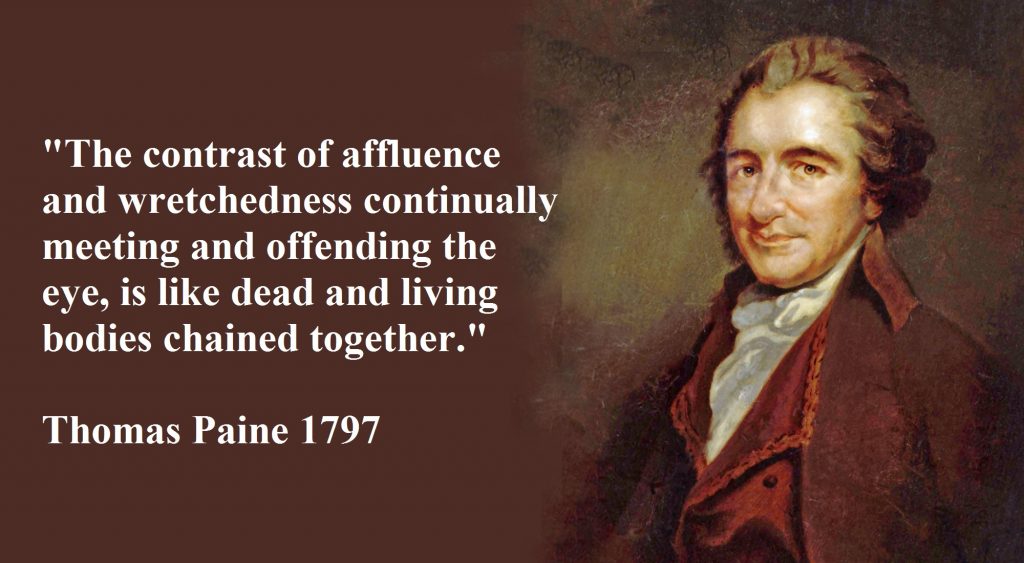
Geoffrey M. Hodgson
Once upon a time, all socialists saw the ‘common ownership of the means of production, distribution and exchange’ as their primary aim. Many die-hards still do.
Others now focus instead on reducing inequalities of power, wealth and income. Some past or present contenders for leadership of the UK Labour Party, including Yvette Cooper and Owen Smith, have argued that the party’s aims in Clause Four of its constitution, should be rewritten to give greater emphasis to equality.
Smith has gone even further, to declare that Labour should focus on ‘equality of outcomes’ and not simply equality of opportunity. He proposed a wealth tax and an increase of the top rate of income tax to 50 per cent. Jeremy Corbyn’s leadership team claimed that they had already adopted these policies.
 Given the huge and growing inequalities within modern capitalism, this focus on inequality is a positive move. But concern about inequality has never been confined to socialism. Ritual incantation of the aim for a ‘socialist’ future within the Labour Party may divert attention from measures that can be implemented within capitalism and without widespread common ownership.
Given the huge and growing inequalities within modern capitalism, this focus on inequality is a positive move. But concern about inequality has never been confined to socialism. Ritual incantation of the aim for a ‘socialist’ future within the Labour Party may divert attention from measures that can be implemented within capitalism and without widespread common ownership.
We also need to look at the basic drivers of inequality within capitalism. We must consider what can be done, within this system, and short of some mythical socialist future.
The practicalities of trying to reduce inequality within capitalism have to be addressed. If higher taxes are part of the solution, then somehow, in a democracy, people have to be persuaded to adopt them. Additional measures to help reduce inequality should be devised.
Furthermore, talk of ‘equality of outcomes’ is ill-advised. Are we really going to give everyone the same income and wealth, thus removing incentives for creativity and hard work? Is the communist utopia – ‘from each according to his ability, to each according to his need’ – practical, or even desirable?
The aim should be to dramatically reduce inequality, not to eliminate it. Incentives for hard work and enterprise should be retained.
Shifting the focus from common ownership to the reduction of inequality is an important step forward. But the analysis of causes, and the design of policy, have to be much more sophisticated.
The problem of inequality
At least nominally, capitalism embodies and sustains an Enlightenment agenda of freedom and equality. Typically there is freedom to trade and equality under the law, meaning that most adults – rich or poor – are formally subject to the same legal rules. But with its inequalities of power and wealth, capitalism darkens this legal equivalence.
Richard Wilkinson and Kate Pickett showed multiple deleterious effects of inequalities of income and wealth. Using data from twenty-three developed countries and from the separate states of the United States, they observed negative correlations between inequality, on the one hand, and physical health, mental health, education, child well-being, social mobility, trust and community life, on the other hand. They also found positive correlations between inequality and drug abuse, imprisonment, obesity, violence, and teenage pregnancies. They suggested that inequality creates adverse outcomes through psycho-social stresses generated through interactions in an unequal society.
 Although economic inequality is endemic to capitalism, data gathered by Thomas Piketty in his Capital in the Twentieth Century, and by me in my book entitled Conceptualizing Capitalism, show that there are large variations in measures of inequality in different major capitalist countries, and through time. The existence of such variety within capitalism suggests that it possible to alleviate inequality, to a significant degree, within capitalism itself.
Although economic inequality is endemic to capitalism, data gathered by Thomas Piketty in his Capital in the Twentieth Century, and by me in my book entitled Conceptualizing Capitalism, show that there are large variations in measures of inequality in different major capitalist countries, and through time. The existence of such variety within capitalism suggests that it possible to alleviate inequality, to a significant degree, within capitalism itself.
But first we must be clear about the drivers of inequality within the system. What are the mechanisms within capitalism that exacerbate inequalities of income or wealth?
Some inequality results from individual differences in talent or skill. But this cannot explain the huge gaps between rich and poor in many capitalist countries. Much of the inequality of wealth found within capitalist societies results from inequalities of inheritance. The process is cumulative: inequalities of wealth often lead to differences in education, economic power, and further inequalities in income.
Do markets create inequality?
To what extent can inequalities of income or wealth be attributed to the fundamental institutions of capitalism, rather than a residual landed aristocracy, or other surviving elites from the pre-capitalist past? A familiar mantra is that markets are the source of inequality under capitalism. Can markets be blamed for inequality?
In real-world markets different sellers or buyers vary hugely in their capacities to influence prices and other outcomes. When a seller has sufficient saleable assets to affect market prices, then strategic market behaviour is possible to drive out competitors.
Would more competition, with greater numbers of market participants, fix this problem? If markets per se are to be blamed for inequality, then it has to be shown that competitive markets also have this outcome. Unless we can demonstrate their culpability, blaming competitive markets for inequalities of success or failure might be like blaming the water for drowning a weak swimmer.
To demonstrate that competitive markets are a source of inequality we would have to start from an imagined world where there was initial equality in the distribution of income and wealth, and then show how markets led to inequality. I know of no such theoretical explanation.
Markets involve voluntary exchange, where both parties to an exchange expect benefits. One party to the exchange may benefit more than the other; but there is no reason to assume that individuals who benefit more, or benefit less (in one exchange) will generally do so. And if some traders become more powerful in the market than others, then its competitiveness is reduced.
The sources of inequality within capitalism
So if markets per se are not the root cause of inequality under capitalism, then what is? A clear answer to this question is vital if effective policies to counter inequality are to be developed. Capitalism builds on historically-inherited inequalities of class, ethnicity, and gender. By affording more opportunities for the generation of profits, it may also exaggerate differences due to location or ability. Partly through the operation of markets, it can also enhance positive feedbacks that further magnify these differences. But its core sources of inequality lie elsewhere.
 Because waged employees are not slaves, they cannot use their lifetime capacity for work as collateral to obtain money loans. The very commercial freedom of workers denies them the possibility to use their labour assets or skills as collateral.
Because waged employees are not slaves, they cannot use their lifetime capacity for work as collateral to obtain money loans. The very commercial freedom of workers denies them the possibility to use their labour assets or skills as collateral.
By contrast, capitalists may use their property to make profits, and as collateral to borrow money, invest and make still more money. Differences become cumulative, between those with and without collateralizable assets, and between different amounts of collateralizable wealth. Even when workers become home-owners with mortgages, the wealthier can still race ahead.
Unlike owned capital, free labour power cannot be used as collateral to obtain loans for investment. At least in this respect, capital and labour do not meet on a level playing field, this asymmetry is a major driver of inequality.
The foremost generator of inequality under capitalism is not markets but capital. This may sound Marxist, but it is not. I define capital differently from Marx and from most other economists and sociologists. My definition of capital corresponds to its enduring and commonplace business meaning. (Piketty’s definition is also similar to mine.) Capital is money, or the realizable money-value of collateralizable property. Unlike labour, capital can be used as collateral and the loan obtained can help generate further wealth.
Because workers are free to change jobs, employers have diminished incentives to invest in the skills of their workforce. Especially as capitalism becomes more knowledge-intensive, this can create an unskilled and low-paid underclass and further exacerbate inequality, unless compensatory measures are put in place. A socially-excluded underclass is observable in several developed capitalist countries.
Another source of inequality results from the inseparability of the worker from the work itself. By contrast, the owners of other factors of production are free to trade and seek other opportunities while their property makes money or yields other rewards. This puts workers at a disadvantage. Through positive feedbacks, even slight disadvantages can have cumulative effects.
None of these core drivers of inequality can be diminished by extending markets or increasing competition. These drivers are congenital to capitalism and its system of wage labour. If capitalism is to be retained, then the compensatory arrangements that are needed to counter inequality cannot simply be extensions of markets or private property rights.
These ineradicable asymmetries between labour and capital mean that ultra-individualist arguments against trade unions are misconceived. In a system that is biased against them, workers have a right to organize and defend their rights, even if it reduces competition in labour markets.
The relevance of Thomas Paine
Contrary to a widespread myth, Thomas Paine (1737-1809) was a liberal rather than a socialist. There is no support for common ownership in his writings. Instead he support private enterprise and a market economy.
But over two hundred years ago, he set out arguments and methods for reducing inequality. Paine recognised that ownership of property was vital, to provide incentives for the generation of wealth and to provide a means for its fairer distribution.
Paine argued for an inheritance tax, but balanced this by a grant to each adult at reaching the age of maturity. In this way, wealth would be recycled from the dead to the young, providing greater equality of opportunity across the board. Paine also advocated welfare provision and a guaranteed pension for those over 50.
Much of the wealth in Paine’s time was in land. Land and buildings are immobile, and can be readily assessed and taxed. But capital is fleet-footed and covert: it can be easily moved around the world or hidden in foreign accounts. Land ownership is still highly concentrated in a few hands, along with much additional wealth.
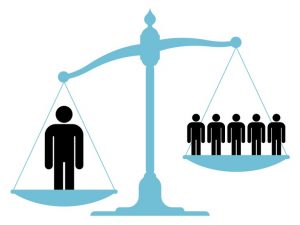 Today we face problems of inequality even greater than those addressed by Paine. In the USA, the richest 1 per cent own 34 per cent of the wealth and the richest 10 per cent own 74 per cent of the wealth. In the UK, the richest 1 per cent own 12 per cent of the wealth and the richest 10 per cent own 44 per cent of the wealth. In France the figures are 24 cent and 62 per cent respectively. The richest 1 percent own 35 percent of the wealth in Switzerland, 24 per cent in Sweden and 15 percent in Canada.
Today we face problems of inequality even greater than those addressed by Paine. In the USA, the richest 1 per cent own 34 per cent of the wealth and the richest 10 per cent own 74 per cent of the wealth. In the UK, the richest 1 per cent own 12 per cent of the wealth and the richest 10 per cent own 44 per cent of the wealth. In France the figures are 24 cent and 62 per cent respectively. The richest 1 percent own 35 percent of the wealth in Switzerland, 24 per cent in Sweden and 15 percent in Canada.
Although there are important variations, other developed countries show similar patterns of inequality within this range. The problem is extreme in the USA. Lower levels of inequality elsewhere are far from satisfactory, but they indicate what might be politically feasible for the currently more unequal countries.
Spreading property
Bruce Ackerman and Anne Alstott took up Paine’s agenda in their proposal for a ‘stakeholder society.’ They argued that ‘property is so important to the free development of individual personality that everybody ought to have some’. They echoed Francis Bacon: ‘Wealth is like muck. It is not good but if it be spread.’
 To this end, home ownership is of positive value, as a means of widely extending ownership of collateralizable property. But there also needs to be a substantial amount of social housing available for rent, to cater for those unable to afford to buy their own homes.
To this end, home ownership is of positive value, as a means of widely extending ownership of collateralizable property. But there also needs to be a substantial amount of social housing available for rent, to cater for those unable to afford to buy their own homes.
Significantly, the Right has promoted home ownership, while it has often been rebutted by the Left. This resistance comes from the Left’s old-fashioned, over-extended collectivism. By contrast, it is important for the Left to champion home ownership within an egalitarian and redistributive political programme.
When Margaret Thatcher introduced the ‘right to buy’ for tenants in social housing in 1980, Labour responded in its 1983 General Election Manifesto with a pledge to reverse these sales. But by 1985 Labour had abandoned this position.
Recycling wealth across generations
Ackerman and Alstott stressed progressive taxes on wealth rather than on income. Echoing Paine, they proposed a large cash grant to all citizens when they reach the age of majority, around the benchmark cost of taking a bachelor’s degree at private university in the United States. This grant would be repaid into the national treasury at death. To further advance redistribution, they argued for the gradual implementation of an annual wealth tax of two percent on a person’s net worth above a threshold of $80,000. Like Paine, they argued that every citizen has the right to share in the wealth accumulated by preceding generations. A redistribution of wealth, they proposed, would bolster the sense of community and common citizenship.
 Increased wealth or inheritance taxes are likely to be unpopular because they are perceived as an attack on the wealth that we have built up and wish to pass on to our children or others of our choice. But the brilliance of Paine’s 1797 proposal for a cash grant at the age of majority is that it offers a quid-pro-quo for wealth or inheritance taxes at later life.
Increased wealth or inheritance taxes are likely to be unpopular because they are perceived as an attack on the wealth that we have built up and wish to pass on to our children or others of our choice. But the brilliance of Paine’s 1797 proposal for a cash grant at the age of majority is that it offers a quid-pro-quo for wealth or inheritance taxes at later life.
People will be more ready to accept wealth taxation if they have earlier benefitted from a large cash grant in their youth. Wealth would by recycled to younger generations rather than syphoned away. The more fortunate or successful can be persuaded to give up some of their advantages if they see the benefits for society as a whole.
A related proposal, also redolent of Paine, was launched by the British Labour Government in 2005. It introduced a Child Trust Fund with the aim of ensuring every child has savings at the age of 18, giving every child a financial boost that they could use for the purposes of education or enterprise. Children received an initial £250 subscription from the government. Family and friends could top up these trust funds. The child would attain control of the fund at age 18. Withdrawals could then be made but be exempt from taxation. A weakness of this particular scheme was its timidity. A greater government subscription would have been more redistributive and egalitarian in its consequences. Child Trust Funds were opposed by the Conservatives and the Liberal Democrats, and abolished after they came to power in a coalition in 2010.
Extending education and share ownership
In the economy, there are many ways of spreading power and influence more broadly. The idea of extending employee shareholding is growing in popularity. This is a flexible strategy for extending ownership of revenue-producing assets in society. In the USA alone, over ten thousand enterprises, employing over ten million workers, are part of employee-ownership, stock bonus, or profit-sharing schemes. Employee ownership can increase incentives, personal identification with the enterprise, and job satisfaction for workers. The evidence suggests that when employee-ownership schemes and some employee participation in decision-making are combined, greater increases in profitability and productivity can be obtained.
As modern capitalist economies become more knowledge-intensive, access to education to develop skills becomes all the more important. Those deprived of such education suffer a degree of social exclusion, and, unless it is addressed, this problem is likely to get worse. Widespread skill-development policies are needed, alongside integrated measures to deal with job displacement and unemployment.
A universal basic income
The need for ongoing education is one argument for a basic income guarantee. Such a basic income would be paid to everyone out of state funds, irrespective of other income or wealth, and whether the individual is working or not. It is justified on the grounds that individuals require a minimum income to function as free and choosing agents. The basic means of survival are necessary to make use of our liberty, to have some autonomy, to function as effective citizens, to develop ethically, and to participate in civil society. These are conditions of adequate and educated inclusion in the market world of choice and trade.
A basic income would also reward otherwise unpaid work in care for the sick or elderly, which is often performed within families. A basic income would also encourage new entrepreneurs and creative artists. There would also be a huge saving in administration costs of often complex social security and welfare schemes. The level of the basic income does not have to be high. It can be set as a basic minimum for survival, thus retaining strong incentives for most people to seek additional sources of income.
Some forms of unconditional basic income have been pledged or introduced in several countries, including Brazil and Finland. Several developed countries have legal minimum income entitlements. In 1968, James Tobin, Paul A. Samuelson, John Kenneth Galbraith, and another twelve hundred economists signed a document calling for the US Congress to introduce a system of income guarantees and supplements. Winners of the Nobel Prize in Economics who fully support a basic income include Milton Friedman, Friedrich Hayek, James Meade, Herbert Simon, and Robert Solow. Significantly, this idea cuts across the political spectrum.
Conclusion
A key challenge for modern capitalist societies, alongside the needs to protect the natural environment and enhance the quality of life, is to retain the dynamic of innovation and investment while ensuring that the rewards of the global system are not returned largely to the richer owners of capital. As Paine put it in 1797:
All accumulation, therefore, of personal property, beyond what a man’s own hands produce, is derived to him by living in society; and he owes on every principle of justice, of gratitude, and of civilization, a part of that accumulation from whence the whole came.
But the benefits of ‘living in society’ are not simply through the advantages of cooperation or the division of labour. Modern societies have developed complex institutions that have empowered innovations and massive expansions of wealth. The ultimate and indivisible accumulation is not simply of things, but of knowledge, relations and rules, guarded by law within an adaptable and pluralist polity.
We need to update Paine’s approach to dealing with inequality, to suit modern times.
30 July 2016
Edited 31 July 2016
|
My forthcoming book elaborates on some of the political issues raised in this blog:
Wrong Turnings: How the Left Got Lost
To be published by University of Chicago Press in November 2017
|
Bibliography
Ackerman, Bruce and Alstott, Anne (1999) The Stakeholder Society (New Haven, CT: Yale University Press).
Atkinson, Anthony B. (2015) Inequality: What Can Be Done? (Cambridge MA: Harvard University Press).
Bowles, Samuel and Gintis, Herbert (1999) Recasting Egalitarianism: New Rules for Markets, States, and Communities (London: Verso).
Bowles, Samuel and Gintis, Herbert (2002) ‘The Inheritance of Inequality’, Journal of Economic Perspectives, 16(3), Summer, pp. 3-30.
Claeys, Gregory (1989) Thomas Paine: Social and Political Thought (London and New York: Routledge).
Credit Suisse Research Institute (2012) Credit Suisse Global Wealth Databook 2012 (Zurich: Credit Suisse Research Institute).
Hodgson, Geoffrey M. (2015) Conceptualizing Capitalism: Institutions, Evolution, Future (Chicago: University of Chicago Press).
Paine, Thomas (1797) Agrarian Justice: Opposed to Agrarian Law and to Agrarian Monopoly (Philadelphia: Folwell).
Paine, Thomas (1945) The Complete Writings of Thomas Paine, edited and introduced by Philip S. Foner (New York: Citadel Press).
Piketty, Thomas (2014) Capital in the Twenty-First Century (Cambridge, MA: Belknap Press).
Robinson, Andrew M. and Zhang, Hao (2005) ‘Employee Share Ownership: Safeguarding Investments in Human Capital’, British Journal of Industrial Relations, 43(3), September, pp. 469-88.
Wilkinson, Richard and Pickett, Kate (2009) The Spirit Level: Why More Equal Societies Almost Always Do Better (London: Allen Lane).
Posted in Common ownership, Jeremy Corbyn, Labour Party, Left politics, Liberalism, Markets, Nationalization, Politics, Private enterprise, Right politics, Socialism, Uncategorized
July 23rd, 2016 by geoffhodgson1946

A Worker Cooperative in New York City
Geoffrey M. Hodgson
‘The question we ask today is not whether our government is too big or too small, but whether it works … Nor is the question before us whether the market is a force for good or ill. Its power to generate wealth and expand freedom is unmatched.’
Barack Obama, 2009.
Politicians engage in slogans and sound-bites, but sometimes they reveal their true aims.
The Labour Party is now immersed in a battle for its leadership, and possibly for its survival as a viable political party. Jeremy Corbyn, overwhelmingly elected as leader in 2015 by about sixty per cent of the party membership, has lost the confidence of about eighty per cent of the party’s MPs.

Owen Smith
Owen Smith, Corbyn’s challenger for the Labour leadership, once worked for the private, research-based, pharmaceutical company Pfizer. In response, Corbyn and his allies have been quick to condemn Smith’s association with private enterprise.
Corbyn has always been a supporter of the original version of Labour’s Clause Four, with its aim of ‘common ownership of the means of production, distribution and exchange’. But since he became Labour Leader, he has kept this long-term aim mostly under wraps, highlighting his opposition to austerity economics instead.
However, on 21 July 2016, we had a brief peep under the tarpaulin, showing us Corbyn’s real aims.
Corbyn’s opposition to privately-funded pharmaceutical research
 The Association of the British Pharmaceutical Industry (ABPI) – the trade association for over 120 UK companies producing prescription medicines – quickly responded with a statement questioning Corbyn’s judgement in this area.
The Association of the British Pharmaceutical Industry (ABPI) – the trade association for over 120 UK companies producing prescription medicines – quickly responded with a statement questioning Corbyn’s judgement in this area.
The ABPI pointed out that the pharmaceutical industry invests more than £88bn a year into research and development for new medicines and vaccines to help fight disease. In the UK this equates to £4.1bn per year of investment in R&D, with the Medical Research Council contributing £770m and research charities £1.3bn.
The pharmaceutical industry is global, and it is difficult to see how the taxpayer-funded UK Medical Research Council could take over the roles of the large private players in this sphere, unless this research was dramatically diminished. As the ABPI pointed out, research in this area has to be a collaboration between industry researchers, academics and clinicians, involving both public and private institutions.
Many successes in the development of drug treatments – including for breast cancer and HIV – have involved collaborations between research-oriented universities, risk-taking companies, concerned charities, government agencies, and so on. Typically these collaborations involve complex synergies and are international in scope.
Corbyn’s proposal that modern levels of pharmaceutical research should be publicly rather than privately funded – within one country – is feasible in neither budgetary nor practical terms.2
But further, in his zeal for the public takeover of research and development, Corbyn has failed to learn one of the crucial economic lessons of the twentieth century, concerning the limitations of largely publicly-owned R&D and need more broadly for a healthy, innovative, private sector.
This lesson is sketched out later below. It concerns the vital role of different forms of private enterprise – from corporations to worker cooperatives, which all have legal autonomy and they sell their products on a market. But first we emphasise that the essential role of the state and the public sector.
The state and the public sector are vital
We should also understand the vital role of the public sector in modern capitalist economists, including in the sphere of research. Numerous authors, including Richard Nelson, Ha-Joon Chang, Erik Reinert, Mariana Mazzucato and myself, have argued that – for several reasons – the state plays an essential, supportive role within modern capitalism.
 In practical terms, evidence shows that the most successful economies are those that involve a collaboration of public and private institutions, including for research, development and innovation.
In practical terms, evidence shows that the most successful economies are those that involve a collaboration of public and private institutions, including for research, development and innovation.
For example, the modern patent system is backed up by legal and state powers that protect innovations from plagiarism and provide incentives for private research and creativity. It is an example of the way in which the state can maintain institutions that encourage private research.
There are areas where private enterprise works best, and there are areas where the public sector can be usefully involved. Determining these best areas in each case, is a practical question, involving detailed, complex, ongoing, empirical examination and experimentation.
Instead, Corbyn resorts to ideology, with this prescription: public ownership works best, and even when in doubt, nationalize. This is the mirror image of free-market ideologists, who stipulate: markets work best, and even when in doubt, privatize.
A simplistic ideological debate between private and public ownership dominated the twentieth century. The ‘common ownership’ version of Labour’s Clause Four, which lasted from 1918 to 1995, expressed one side in the debate. Margaret Thatcher and Ronald Reagan, among many others, took the other side.
A key lesson of the twentieth century is that the dichotomy between public and private provision is misleading. The key question is how they can be usefully combined. Within any useful combination, both private and public enterprise have a crucial role to play. This essay explains why a private sector is vital.
My recent book entitled Conceptualizing Capitalism explains why the role of the state is also crucial, even to sustain the institutions that make private enterprise work. But here I concentrate on the case for private enterprise.
The failure of centrally-planned innovation
Any vision of a large-scale planned economy involves assembling information in local or national agencies, and then making decisions based on this information. Proposed innovations and other changes must be appraised, and decisions on their viability must be made.
In their schemes to bring all knowledge together into the hands of planners, advocates of comprehensive planning overlook the time and other difficulties involved in gathering and dealing with available information. Also they give inadequate consideration to how innovations are to be incentivized, tested and promoted.
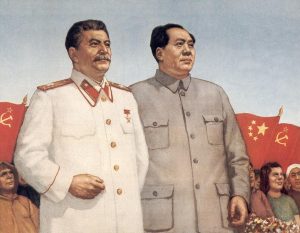 Innovation depends on hunches about the future. Successful innovation takes into account local, tacit and other knowledge concerning circumstances and possibilities. Much of this knowledge involves complex details and contexts, and cannot all be brought together and utilized by a central committee or planning authority.
Innovation depends on hunches about the future. Successful innovation takes into account local, tacit and other knowledge concerning circumstances and possibilities. Much of this knowledge involves complex details and contexts, and cannot all be brought together and utilized by a central committee or planning authority.
Because of diminished competitive pressures, nationalized industries in centrally planned economies, such as the Soviet Union and Mao’s China, have been unimpressive in terms of innovation and flexibility. Why should a committee back innovation or change, especially when it carries risks of failure? Why should they risk their jobs when they have no secure right of additional reward in the case of success?
The economist Peter Murrell showed empirically that the former Communist countries were apparently no less efficient in allocating resources than capitalist economies. Where they lagged was in terms of dynamic efficiency: the ability to innovate. This shortfall is endemic to any system that works on the basis of hierarchical planning, rather than independent enterprise with legal rights to reap and retain rewards.
Whatever the limitations of a market system, it has the advantage that it does not require majority agreement before a decision can be made to produce or distribute a good or service. Private property and contracts permit zones of autonomy within an interrelated system; agents may reach decisions through negotiated contracts with others. The costs and benefits are devolved to individuals or firms.
Through private enterprise it is possible for many technological or institutional innovations to be pioneered without the prior agreement of (democratic) committees or (undemocratic) bureaucrats. This analysis is borne out by experience. The former Soviet-type economies in Russia and China lacked devolved autonomy, secured by private ownership.
Eventually they learned that lesson. The change in China was most dramatic. After the Communist Revolution of 1949, agriculture in China was organized into large collective farms. Other than by threats and bureaucratic bullying, farmers had little incentive to improve productivity. Risky innovation was unwise. Productivity remained low and often there were shortages of food. But Mao Zedong died in 1976, opening up the possibility of reform.
 In 1978 some Chinese peasant farmers decided to withdraw from collective farms and take responsibility for production at the household level, where the household (instead of the collective) received the revenue from its sold output. Individual households had much greater incentives to work harder and to innovate. After decades of slow growth under Mao, China’s explosive economic growth began with those changes in rural areas. As a result, unprecedented millions were lifted out of poverty.
In 1978 some Chinese peasant farmers decided to withdraw from collective farms and take responsibility for production at the household level, where the household (instead of the collective) received the revenue from its sold output. Individual households had much greater incentives to work harder and to innovate. After decades of slow growth under Mao, China’s explosive economic growth began with those changes in rural areas. As a result, unprecedented millions were lifted out of poverty.
China’s spectacular economic growth began when agriculture began to pass into the private control of the peasants after 1978. The Chinese Communist Party endorsed these changes in the rights to use and manage land (while keeping legal title to the land in the hands of the collectives), and also promoted private businesses in rural areas.
China also retained many state-owned enterprises. The state continued to play a major strategic role in economic development. China has demonstrated how viable public and private sectors are essential for growth and innovation in a modern large-scale economy.
The failure of classic socialism
Some version of socialism might work on a small scale. Cooperation can work in this context, based on close, inter-personal interactions. Humans have co-operated in this way, in families and tribal groups, for many thousands of years.

Elinor Ostrom
Nobel Laureate Elinor Ostrom studied the management of common-pool resources – such as medieval common land, fisheries or agricultural irrigation schemes – and showed how they can be effectively managed by relatively small local communities.
Their small size allows participants to monitor each other, to ensure that necessary tasks are carried out and that the interests of the community are served.
Enforcement mechanisms range from praise to punishment. Within these relatively small and cohesive groups, trust and targeted sanctions are mechanisms for encouraging cooperation, reciprocity and compliance with customary rules.
But socialism on a small scale would lack the economies of large-scale production and the technological dynamism of today’s competitive capitalism. Modern medicines and technologically-advanced treatments, requiring extensive funding, risk-taking and research collaboration, could not be developed. With inferior drugs and healthcare, human longevity would be lower than it is today.
In larger socialist societies, individual incentives for effort and innovation are diminished, and compensatory, face-to-face, trust-based mechanisms to sustain cooperation are relatively less effective. When we move from communities of a hundred or so, where it is possible for everyone to know everyone else, to communities of thousands or more, then interpersonal trust and reputation are much less effective at the overall level, and they have to be supplement both other incentives and constraints.
When thousands of people are brought together, and rewards are shared, then there is less incentive to make the extra effort, because the rewards from that additional work would be hugely diluted.
Large private corporations face this problem too. But competitive pressure on the private corporation obliges it to incentivise its workforce in some way, so that most employees pull their weight.
Market competition is absent or much diminished in a centrally planned economy. Instead, the pressure to perform comes from the state. Consequently, strong discipline is necessary to sustain production, and larger-scale socialism engenders authoritarianism and bureaucracy. Twentieth-century evidence strongly supports this analysis.
Those that propose ‘democratic socialism’ in large-scale societies fail to address some key practical questions. How is all the important information to be gathered and transmitted? How are resources to be produced and distributed? How is everyone to be incentivized to work well and to innovate? And if the system is to be ‘democratic’, how would it be possible for everyone involved to vote on every important decision?

Robert Owen
Such practical considerations show that democratic socialism (at least in the classic sense of Robert Owen and Karl Marx, who proposed common ownership and the abolition of private enterprise) is unfeasible in any large-scale complex economy.
While interpersonal interactions can engender cooperation on a small scale, in large-scale societies other mechanisms and incentives are necessary. For dynamism and efficiency, there have to be competition, markets and a large private sector, as well as a state.
Private ownership is also important for political reasons, to create zones of politico-economic power that can countervail state autocracy.
Contrary to the twin, all-or-nothing, ideologies of classical socialism and free-market purism, this leaves open a huge area for economic reform and development. A private sector can be made up of many different kinds of enterprise, including worker cooperatives and social enterprises, as well as more conventional corporations. The state can intervene in a myriad of ways, including the adoption of redistributive taxation and the development of a strong welfare state.
Once all this is understood, then the game changes – irrevocably. Once it is realized that classical socialism cannot work (at least in a humane way) then you have to look for alternatives. Once it is acknowledged that private property and markets are indispensable in large-scale modern economies, then you have to accept them, warts and all. The best that can be done is to minimize their deleterious effects, and to explore viable avenues of institutional reform.
Much of the Labour Party learned this lesson in the era from 1945 to 2015. It adjusted to the mixed economy and began to understand the virtues and indispensability of private enterprise. That lesson seems to be forgotten by a large number of Labour Party members, who continue to support Corbyn and his naïve, outdated ideology. Unless that lesson is learned again, and quickly, then Labour has no future as an electable political party.
23 July 2016
Edited 24 July 2016
|
My forthcoming book elaborates on some of the political issues raised in this blog:
Wrong Turnings: How the Left Got Lost
To be published by University of Chicago Press in November 2017
|
-
Corbyn added that he was in favour of a National Health Service that is ‘totally public’ with ‘publicly employed people running it’. Is he aware that GPs are not NHS employees but self-employed contractors? If so, is it his intention to make all GPs employees?
-
In an interview on 24 July 2016, Corbyn’s ally John McDonnell backtracked on his leader’s statement, re-admitting a role for private sector pharmaceutical research under some vague notion of ‘democratic control’. He said that Corbyn’s statement had been ‘misinterpreted’. But this dishonest manoeuvring under pressure fails to mask their true aims.
Bibliography
Chang, Ha-Joon (2002) Kicking Away the Ladder: Development Strategy in Historical Perspective (Anthem Press: London).
Hayek, Friedrich A. (1944) The Road to Serfdom (London: George Routledge).
Mazzucato, Mariana (2013) The Entrepreneurial State: Debunking Public vs. Private Sector Myths (London and New York: Anthem).
Murrell, Peter (1991) ‘Can Neoclassical Economics Underpin the Reform of Centrally Planned Economies?’ Journal of Economic Perspectives, 5(4), Fall, pp. 59-76.
Nelson, Richard R. (1981) ‘Assessing Private Enterprise: An Exegesis of Tangled Doctrine’, Bell Journal of Economics, 12(1), pp. 93-111.
Nelson, Richard R. (2003) ‘On the Complexities and Limits of Market Organization’, Review of International Political Economy, 10(4), November, pp. 697-710.
Ostrom, Elinor (1990) Governing the Commons: The Evolution of Institutions for Collective Action (Cambridge: Cambridge University Press).
Reinert, Erik S. (2007) How Rich Countries Got Rich … And Why Poor Countries Stay Poor (London: Constable).
Zhou, Kate Xiao (1996) How the Farmers Changed China (Boulder, CO: Westview Press)
Posted in Common ownership, Jeremy Corbyn, Labour Party, Left politics, Liberalism, Markets, Nationalization, Politics, Private enterprise, Right politics, Robert Owen, Socialism, Uncategorized
July 14th, 2016 by geoffhodgson1946

Originally posted 14 July 2016
“A lucid and persuasive piece” – Richard Surr
“A very thoughtful and informative article” – John Boughton
“A frank and thought-provoking assessment” – John Hill
“An excellent and thought-provoking article” – Michael Kelly
“A great read” – Graham Sutton
Geoffrey M. Hodgson
12 July 2016 will go down in UK history for two major political events. First, it was the last full day that David Cameron was Prime Minister. Second, the National Executive Committee of the Labour Party decided to put Jeremy Corbyn on the membership ballot for the party’s re-election of Labour’s leader, despite an overwhelming vote of no confidence against him by Labour MPs.
On this day, the Labour Party destroyed its chances of victory in the next general election. A party so deeply divided cannot win. For Labour, this is the most optimistic assessment: 12 July 2016 might come to be seen as the day that Labour died.
|
My latest book elaborates on some of the political issues raised in this blog:
Wrong Turnings: How the Left Got Lost
Published by the University of Chicago Press in January 2018
|
Progressive Left politics in Britain has to be rebuilt. It is as if the clock has been turned back 100 years. We must begin again.
Labour’s Grim Prospects
Labour now faces another election among its members for its Leader. Even with a strong and commanding alternative candidate, Corbyn is likely to win this contest. This would leave Labour as a party in Parliament where 80 per cent of its MPs have no confidence in its leader.
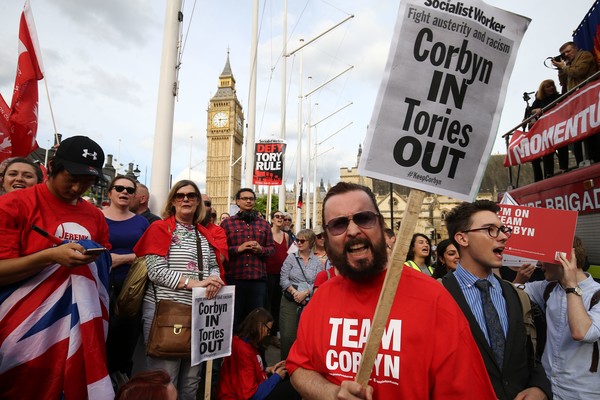 Consequently, all 172 of the ‘rebels’ would face possible deselection by their local constituency parties. Few would survive the show trials by Corbynistas for their alleged crimes. They would be replaced by hard-left stalwarts.
Consequently, all 172 of the ‘rebels’ would face possible deselection by their local constituency parties. Few would survive the show trials by Corbynistas for their alleged crimes. They would be replaced by hard-left stalwarts.
In a more optimistic scenario, suppose that Corbyn is defeated for Leader in the membership vote. At least then, the Parliamentary Labour Party and much of the Labour Party machine would be ostensibly in the same hands. But the party would be in civil war. It would become a cockpit of personal abuse and factional machination, unattractive to ordinary, thoughtful, soft-spoken, Labour supporters. Many of the so-called rebels would be deselected by the local parties that were in Corbynista hands.
Electorates are not fond of parties that are unable to quash their internal feuds. Voter want results – not rifts. The Tories are masters of the swift coup to end dissent. That is because they have a thirst for governmental power. Sadly, much of the Labour membership does not. They prefer to be ideologically pure. That is why Labour is dying. It looks likely to be pulverised in a general election. The chances of a majority Labour government have disappeared, at least for 2020 and maybe forever.
Will the Majority of Labour MPs Breakaway?
Assume that a large segment of Labour MPs breaks away and forms a new party. If their numbers were sufficient, then they could claim the official mantle of Her Majesty’s Opposition. They might outnumber the remaining parties, including the SNP and Corbyn’s Rump Labour. They would have to find a new name, be it ‘Social Democratic Labour’ or whatever.
Finding a name would be the least of their problems.
First the new party would have to be built up from the grassroots, in every winnable constituency. Then there would be the problem of party funding. Gaining credibility in Scotland would also be important.
The Global Crisis of Social Democracy
Added to all this is the global ideological crisis within social democracy itself. Social democracy was originally synonymous with socialism, where the latter meant an economy dominated by public enterprise and planning. Many of the early ‘social democratic’ parties were led by Marxists, including the Social Democratic Workers’ Party of Germany, founded in 1869. Although some social democrats favoured peaceful reform rather than violent revolution, they mostly agreed on the goal of large-scale common ownership.
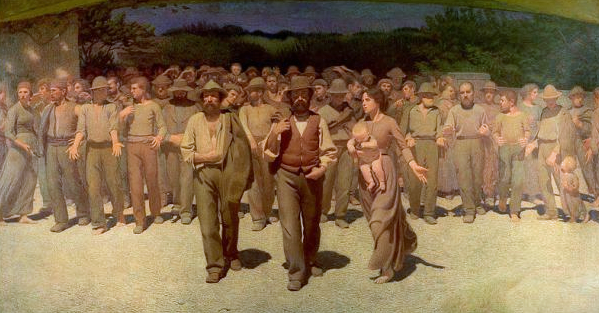
Social democracy began to change its meaning more substantially after 1945, especially when the German Social Democratic Party embraced private enterprise and a mixed economy in 1959. Today social democracy is often distinguished from socialism in terms of a stronger emphasis on a mixed economy and private enterprise, while retaining the goal of greater equality and social justice.
As Neal Lawson has pointed out, modern European social democracy was built during, and affected by, the Cold War of 1948-1991. It was also founded on a mass industrial working class. Until the 1970s there was a widespread concern the USSR might overtake the West in terms of productivity and economic prowess. Post-1945 social democracy was forged as a compromise between Soviet planning and market economy, within a democratic political system, based on the support of industrial workers and progressive intellectuals.
But the sixteen years from 1975 to 1991 saw this consensus collapse. The post-war political settlement, accepted by parties on the Left and Right, disappeared. In addition, de-industrialisation in the West and the shift of much manufacturing to East Asia, pulverised the traditional working class base. The collapse of the Berlin Wall in 1989 ended the Soviet Bloc and its experiment with socialism.

Fall of the Berlin Wall 1989
Consequentially, modern social democracy is now in crisis the world over. It is failing in government in France and it is in retreat almost everywhere else, including in its great heartlands in Northern Europe, and no less in Germany and Scandinavia.
Social democrats have been slow to adjust. As Lawson has argued, they have retained ‘their statism and tribalism, their urge to command and control’. They are ‘at odds with a zeitgeist that demands pluralism, complexity’. They failed to develop an adequate alternative vision of ‘a good society that is about much greater equality but is at odds with consumption without end.’
A problem shared by Marxist, ‘Labour’ and social-democratic parties is that they all stem from a post-Enlightenment, doctrinal offshoot (around Louis Blanqui and others in the 1830s) that focused on the interests and aspirations of the working class, rather than on those of humanity as a whole.
Marxism went furthest in this direction, with its doctrine of class struggle and the ‘dictatorship of the proletariat’. But the very name ‘Labour’ speaks to one class rather than to all humanity. One of the great lessons of the Enlightenment is that human rights are universal. Especially in our fractured world, political parties should have a universal appeal.
In particular, the very aim of greater economic equality should be seen not as an outcome of envy, struggle or revenge, but as a moral mission to make society more amenable and cohesive for all.
Class-based, social-democratic, mind-sets have dominated both the Left and Right of the Labour Party for the last seventy years. If the majority of Labour MPs try to build something out of the ruins, then they will face the profound problem of reconstructing their own philosophy and identity for the twenty-first century, alongside a myriad of other practical difficulties.
Radical Liberalism
I do not pretend that I have adequate answers, but I am sure that a new radical movement that faces the problems of the twenty-first century must build on the achievement of the political and scientific Enlightenment in the seventeenth and eighteenth centuries. Hence it must relate in some way to the broad liberal tradition that stems from this Enlightenment.
 This tradition emphasises democracy, liberty, equality and cooperation. Socialism derives from the Enlightenment, but has been neither consistent nor adequate in the pursuit of these goals.
This tradition emphasises democracy, liberty, equality and cooperation. Socialism derives from the Enlightenment, but has been neither consistent nor adequate in the pursuit of these goals.
In particular, the liberal tradition also recognises that private property is essential to a dynamic economy, notwithstanding the importance of state intervention in health, education, market regulation, redistribution and elsewhere. As the twentieth century shows us, some private property is a necessary (but insufficient) guarantee of liberty. Its abolition has without exception led to totalitarianism.
It is for the reason that one of the greatest achievements of liberal and Enlightenment thought, the United Nations Universal Declaration of Human Rights, includes these words: ‘Everyone has the right to own property alone as well as in association with others. No one shall be arbitrarily deprived of his property.’ Property, in short, is a basic human right.
At the same time, property-owning market economies have important limitations. These must be addressed without destroying private enterprise, competition and the well-springs of innovation and wealth. Greed and individualism must be countervailed by a recognition that, just as we have all benefitted from the work of others, we have a duty to society in return. Extreme inequalities of income and wealth are deleterious to social solidarity and cohesion, and these too must be tackled. This puts radical policies, such as a guaranteed basic income and some viable form of redistributive taxation, on the agenda.

Thomas Paine
Everything I mention in the previous paragraph was considered at length by the great Anglo-American radical Thomas Paine (1737-1809). Contrary to widespread belief, Paine was not a socialist. He was a radical liberal.
Take another relevant example. John Stuart Mill (1806-1873) was concerned about the problems of inequality, in wealth, power, voting rights and income. He advocated not simply a market economy but forms of cooperation, particularly worker cooperatives.
John A. Hobson (1858-1940), was a liberal and one of the great neglected economists of the last 150 years. He developed a theory of unemployment and opposed the imperialism of the great powers.
From 1908 to 1914 Herbert H. Asquith (1852-1928), as Liberal Prime Minister, led his party to a series of major reforms, including social insurance and the reduction of the power of the House of Lords. Asquith laid the foundations of the Britain’s welfare state. His Liberal successor, David Lloyd George (1863-1945), gave the vote to women in 1919 (but not on the same terms as men).
The Liberal Democrats
So why not join the Liberal Democrats?
Imagine we are back in 2005, with Charles Kennedy as Leader, but Labour in today’s mess. For many readers the Liberal Democrats would be an attractive option.
Kennedy became leader in 1999. His party won 52 seats in the 2001 election – their highest tally since 1923. He shifted his party to the Left and– unlike Labour and the Tories – the Liberal Democrats came out firmly against the 2003 invasion of Iraq. In the 2005 general election, 62 Liberal Democrats were elected. Kennedy stood down in 2006.
Nick Clegg became leader in 2007. After the economic crash of 2008, Clegg told his party at its 2009 annual conference that ‘savage cuts’ were needed to deal with the mounting budget deficit. When the 2010 election granted no single party an overall majority, Clegg argued that Labour was incapable of making the cuts in public expenditure that he deemed necessary. This was a key argument in persuading his party to join a coalition with the Tories. Kennedy voted against this coalition.
To some degree, the coalition did act as a check on the ideological, axe-wielding, Tory Right. They blocked, and postponed for five years, the dreadful mistake of the referendum on Europe. But the Liberal Democrats under Clegg made the serious mistake of willingly participating in a misconceived and highly damaging programme of cuts in vital public services and investment.
The Liberal Democrats also wrongly blamed Labour for overspending prior to the crash. In fact, Labour had the finances under control before 2008 and the big spending was needed after the crash, to save the financial system from collapse.
Clegg and other members of the Liberal Democrats had forgotten key lessons from their own history. Asquith learned the dangers of doing deals with the Tories. Lloyd George was cast aside by them in 1922 just as Clegg’s party was deliberately crushed by the Tory machine in the 2015 election.

John Maynard Keynes
Just as grave was the abandonment of Keynesianism by the Liberal Democrats. John Maynard Keynes (1883-1946) was a life-long Liberal and one of the greatest economists of all time. Keynes argued that the first priority of government was not the reduction of its deficit but the maximisation of employment. Through growth and greater employment a government could accrue greater income to resolve its budgetary problems. Attempts to deal with deficits by reducing government expenditure and austerity would be self-defeating: the economy would contract (or grow more slowly) and the deficit would increase.
The failure of a strategy of austerity has become abundantly clear in the six years that George Osborne was Conservative Chancellor of the Exchequer since 2010. The Liberal Democrats need to shout more loudly that they have learned that lesson.
Labour and the Liberal Democrats – Their Aims
Ever since Labour removed its commitment to common ownership from its constitution in 1995, its institutional aims have been unclear. The current Labour Party Constitution outlines commendable principles such as by ‘common endeavour we achieve more than we achieve alone’. It laudably aims for a society where ‘power, wealth and opportunity are in the hands of the many not the few’ and ‘where we live together freely, in a spirit of solidarity, tolerance and respect’.
But these words are too vague to provide a clear goal. They might be deemed consistent with a range of idealistic plans, from statist socialism to egalitarian ‘people’s capitalism’.
Labour’s current Clause Four Part One is silent on the question of property, whether it is to be private or owned in common. Reference to ‘a thriving private sector’ is tucked away in Part Two, alongside a mention of public ownership or accountability where ‘essential to the common good’.
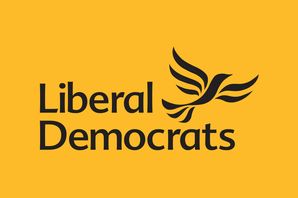 The Preamble to the Constitution of the Liberal Democrats is much clearer. It mentions ‘a strong and sustainable economy which encourages the necessary wealth creating processes, develops and uses the skills of the people and works to the benefit of all, with a just distribution of the rewards of success.’
The Preamble to the Constitution of the Liberal Democrats is much clearer. It mentions ‘a strong and sustainable economy which encourages the necessary wealth creating processes, develops and uses the skills of the people and works to the benefit of all, with a just distribution of the rewards of success.’
It continues: ‘We want to see democracy, participation and the co-operative principle in industry and commerce within a competitive environment in which the state allows the market to operate freely where possible but intervenes where necessary.’
It declares: ‘We will work for a sense of partnership and community in all areas of life. We recognise that the independence of individuals is safeguarded by their personal ownership of property, but that the market alone does not distribute wealth or income fairly. We support the widest possible distribution of wealth’.
This commitment to greater equality could be strengthened. There are other omissions, which have increased in importance in today’s multi-cultural Britain. They include measures for the development of social integration and cohesion, particularly by winding down state-funded faith schools.
No party is perfect, and we are obliged to compromise to get anywhere.
 In the current crisis, the Liberal Democrats have another strong card to play. Since 1959 they have been firmly in favour of (what is now called) the European Union. Labour was for withdrawal in 1983. Subsequently it changed its policy back to staying in. But Corbyn was in favour of leaving the EU until he became leader in 2015. His ambivalence during the referendum campaign was obvious.
In the current crisis, the Liberal Democrats have another strong card to play. Since 1959 they have been firmly in favour of (what is now called) the European Union. Labour was for withdrawal in 1983. Subsequently it changed its policy back to staying in. But Corbyn was in favour of leaving the EU until he became leader in 2015. His ambivalence during the referendum campaign was obvious.
The Liberal Democrats accept the result of the 2016 referendum but are pledged wholeheartedly to restore Britain’s strong ties with Europe, to the point of possible re-entry into the EU in the future.
So why not join the Liberal Democrats?
I just did.
I accept that others will try and retrieve something from the fragments of today’s Labour Party. Perhaps they can help build a base for progressive policies in the devastated former industrial areas, particularly in Wales and the North of England. I wish them success. We all need to work together to help make Britain and the world a better place.
14 July 2016
Bastille Day – liberté, égalité, fraternité.
Minor edits: 15-19 July 2016 and 17 August 2016.
Autobiographical Note
Born in 1946. Raised in rented council housing. Educated at state schools and at the University of Manchester. Member of the Labour Party, 1966-1968 and 1974-2001. Labour Parliamentary Candidate for Manchester Withington in 1979. Briefly advisor for Neil Kinnock and Roy Hattersley in the 1980s.
I left Labour over faith schools, inadequate House of Lords reform and neglect of economic inequality. Would have left over Iraq. Politically unaffiliated 2002-2016.
Bibliography
Claeys, Gregory (1989) Thomas Paine: Social and Political Thought (London and New York: Routledge).
Fishman, William J. (1970) The Insurrectionists (London: Methuen).
Hobson, John A. (1902) Imperialism: A Study (London: James Nisbet).
Mill, John Stuart (1848) Principles of Political Economy with Some of Their Applications to Social Philosophy (London: Parker).
Mummery, Albert F. and Hobson, John A. (1889) The Physiology of Industry (London: John Murray).
Waldron, Jeremy (1988) The Right to Private Property (Oxford and New York: Oxford University Press).
Posted in Common ownership, Democracy, Labour Party, Left politics, Liberalism, Nationalization, Politics, Socialism
July 10th, 2016 by geoffhodgson1946

“A thoughtful analysis of Labour’s current impasse – back to 1918 in more senses than one”
Niamh Hardiman, Professor of Political Science and Public Policy, University College Dublin
Geoffrey M. Hodgson
Tony Blair and Jeremy Corbyn have been pulling Labour in different directions for decades. But under the surface there are some common roots in their thinking. Also Blair created some of the circumstances in which Corbyn was decisively elected as Labour Party Leader in 2015, with 59.5 per cent of the vote.
Both Blair and Corbyn have enjoyed huge support among Labour members. How could this radical transformation of political opinion take place within a large political party, in the space of less than 20 years?
To answer this question we must first briefly examine how Labour evolved from 1945 to 1979, as a mass party based on strong trade unions. Then came the earthquake of Margaret Thatcher’s election victory in 1979. Labour was defeated in three subsequent elections, before Tony Blair led Labour into power for thirteen years. Blair had help to make Labour electable by combining a reforming momentum with a pro-business image, but he did not provide an adequate political philosophy to replace traditional socialism.
This vacuum, combined with the disastrous invasion of Iraq in 2003, and Labour’s part in the financial crash of 2008, created the conditions for the election of Jeremy Corbyn as leader in 2015. Corbyn turned Labour’s ideological clock back by over half a century and lost its prospect of electability.
Post-War Labour: The Broad Church
After the first majority Labour government was elected in 1945, Labour party individual membership was rising rapidly towards one million and trade union membership began a long upward trend, rising from about 8 million in 1945 to 13 million in 1979. In general elections from 1945 to 1979 inclusive, Labour always polled between 36 per cent and 49 per cent of the vote. Labour was a mass party, built on the pillars of organised individual membership, powerful trade union support, a strong presence in parliament, and the loyalty of over a third of the electorate.

Clement Attlee
Labour’s commitment to widespread common ownership was enshrined in Clause Four of its constitution, which had been adopted in 1918. Before he became Prime Minister in 1945, Clement Attlee had expressed his support for this full-blooded socialist vision of a planned economy with widespread public ownership. But the practicalities of government, and the outbreak of the Cold War in 1948, pushed Labour leaders and intellectuals towards social democracy and a mixed economy. The most important statement of this shift was Anthony Crosland’s The Future of Socialism in 1956.
But, despite the efforts of Hugh Gaitskell and others, Labour’s Clause Four remained unchanged. Labour contained both classical socialist and social-democratic currents. But the socialist wing never achieved supremacy, largely because it had insufficient support among the trade unions that were affiliated to the party. The great union flywheel kept Labour on a social-democratic course. The first-past-the-post electoral system made a party split and a socialist breakaway unviable.
The Thatcher Era: From Multiple Defeats to Recovery
The 1979 defeat of the Labour Government under James Callaghan brought Margaret Thatcher to power and an ensuing 18 years of Tory rule. At first, in reaction to this defeat, the traditional socialist wing of the party made gains under the leadership of Tony Benn. In 1980, Michael Foot, a radical social democrat, was elected as party leader. In 1981, Dennis Healey narrowly defeated Benn for the Deputy Leadership. In frustration with Labour’s shift to the Left and the use of union block votes, a sizeable portion split off to form the Social Democratic Party.
Labour’s 1983 general election manifesto prescribed a good dose of nationalisation, an interventionist industrial policy, unilateral nuclear disarmament, higher personal taxation and withdrawal from the European Economic Community (now the European Union). Tested at the polls, Labour’s vote slumped below 28 per cent, for the first time since 1918.

Neil Kinnock
Then Foot resigned. Neil Kinnock was elected as leader, beginning the long process of making Labour electable once again. Kinnock fought the Marxist entryists in the party, modernised its policies on vital issues such as home ownership, and made it more credible.
Meanwhile, Thatcher continued her assault on Labour’s trade union base. A series of restrictive laws reduced trade union powers. By the time that Labour regained power in 1997, trade union membership had been reduced by more than a third. Today, trade union membership is less than half what it was in 1979, notwithstanding a bigger workforce.
The Blair Revolution: From Socialism to Undeclared Liberalism
The long period in opposition from 1979 to 1997 convinced a majority of Labour members that principle was impotent without power, and that some compromises were necessary to make Labour electable. In this climate, Tony Blair was elected as party leader in 1994.
The term ‘New Labour’ separated the party from its previous electoral baggage, including its original primary focus on common ownership and its antagonism to private business. Blair argued that previous socialists had confused means with ends. The desired end was a society in which all individuals would be valued and had the means of self-fulfilment. If common ownership had been a means that end in the past, then it was no longer appropriate for the modern, complex, global economy.

Tony Benn
In 1995 Blair successfully removed Labour’s commitment to ‘common ownership’ from Clause Four of its constitution. But from the Left, Tony Benn protested: ‘Labour’s heart is being cut out’. In a sense Benn was right, common ownership had been Labour’s core principle since 1918, even if no leader since 1945 had made it a primary goal.
Blair hyphenated the word as ‘social-ism’ and attempted to change its meaning. It now meant a recognition of individuals as socially interdependent, the promotion of social justice and of equality of opportunity, recognising the equal worth of each citizen. He also used the term ‘third way’ to describe a path that differed from widespread collectivisation, on the one hand, and unrestrained markets, on the other.
While Blair saw a sizable role for the market, he was not a ‘neoliberal’ or a free-market libertarian. The state was still to play a major role in the economy. But redistributive taxation and the reduction of inequality were not major priorities. Blair’s close ally Peter Mandelson declared in 1998 that the Labour Government was ‘intensely relaxed about people getting filthy rich as long as they pay their taxes’.

Thomas Paine
While Blair redefined and retained the word social-ism, he moved Labour closer to a version of social liberalism. There is a radical tradition of social liberalism, but it is not socialist in the sense of widespread common ownership. The good of the community is seen as harmonious with the freedom of the individual. This tradition stretches from Thomas Paine through John Stuart Mill to Thomas H. Green, John A. Hobson and others.
From Paine onwards, social liberals raised concerns about inequalities of wealth and power. They appreciated the complexity of decision-making and the potential fallibility of government. Hence they advocated flexibility: there was a need for policy experiments and ongoing appraisals. Institutional checks and balances were required. But for Blair it was all about ‘values’, not structures or institutions.
Labour’s nostalgic devotion to the word socialism was too strong. With or without the hyphen, social-ism had become a zombie-term – a mere badge of identity. Labour was still stuck in its old rhetoric and unable to learn much from the broad liberal tradition.
Blairism as Marxism turned Upside-Down
The relationship between means and ends is important. Marxism famously separates ends from means, claiming that ‘the ends justify the means’. For Marxism, all means are evaluated solely in terms of the ends that they are deemed to serve. But in a complex world, we cannot be sure that specific means will lead to their assumed ends. Hence, contrary to Marxism, means must be placed under moral constraints as well.

Karl Marx
Blair argued that the emphasis on common ownership or nationalization confused means with ends. The ends of social harmony and social justice, for example, might be achieved by means other than common ownership. Ironically, by separating means and ends so completely, Blair mirrored Marxism. Blair used a Marx-like separation of ends from means to abandon classical socialist aims.
But means and ends cannot be completely separated. The American philosopher John Dewey pointed out that the pursuit of goal is itself a learning process that can modify our ends. Furthermore, the use of particular means might modify our ends, as we discover unforeseen problems or benefits. Furthermore, the end we uphold is a spur to action, hence also a means of energizing change. Dewey wrote: ‘there is no end which is not in turn a means’.
Blair adopted another dichotomy from Marxism. This is the separation of the sphere of ‘values and beliefs’ from economic structures and patterns of ownership. This is redolent of Marx’s distinction between the ideological ‘superstructure’ and the ‘economic base’. But Blair reversed their importance: for him ‘values and beliefs’ assumed primacy. Adopting the same dichotomy, Marxism was turned upside-down.
This Marxist dichotomy is false. All economic activity involves beliefs, evaluations and value-laden motivations. Values and beliefs are intrinsic to the economy. The economy is not a machine that can be considered separately from the knowledge, beliefs and expectations of the human agents within it.
Blair in Power: From Achievement to Catastrophe
Blair’s highly charismatic and effective leadership led to the electoral landslide of 1997. Labour’s share of the vote jumped from 34.4 per cent in 1992 to 43.2 per cent in 1997. Especially in the early years, his government achieved a great deal. Education and the National Health Service benefitted for large increases in spending.
One of the first major achievements of Blair’s government was the Good Friday Peace Agreement in Northern Ireland. A minimum wage was introduced and devolved assemblies were set up in Scotland and Wales. The Human Rights Act was passed in 1998, but the Blair government was later accused of complicity in human rights abuses abroad. There was important legislation in pursuit of gay rights. Child and pensioner poverty were dramatically reduced. There was continuous economic growth. Many more people were brought into employment.
Blair won another landslide election in 2001. Demonstrably, by a wide margin, he had made Labour electable, after the wilderness of the Thatcher era. But he did not offer Labour a new philosophy or a robust architecture, after the abandonment of traditional socialism and the decline of its trade union base. Even before Iraq, some of his new policies were challengeable.
 For example, Blair’s emphasis on ‘values and beliefs’ over institutional structures allowed him to privatize some public services, including parts of the National Health Service. His claim was that the same esteemed values could endure within any system of ownership. But changes to institutional structures affect the habits and beliefs of those involved. Extending the scope for contracts and markets means – rightly or wrongly – that pecuniary and profit-orientated values can become more pervasive, unless checks are put in place.
For example, Blair’s emphasis on ‘values and beliefs’ over institutional structures allowed him to privatize some public services, including parts of the National Health Service. His claim was that the same esteemed values could endure within any system of ownership. But changes to institutional structures affect the habits and beliefs of those involved. Extending the scope for contracts and markets means – rightly or wrongly – that pecuniary and profit-orientated values can become more pervasive, unless checks are put in place.
Consistent with his emphasis on ‘values and beliefs’, Blair promoted a programme of expansion of publicly-funded faith schools. But religious faiths are not simply ‘values’: they are organised enclaves of group self-protection and survival. As already evident from the long experience of segregation in Northern Ireland, institutionalised separation can exacerbate political, ethnic and cultural divisions.
A 2001 report commissioned by Bradford City Council concluded that its communities were becoming increasingly isolated along racial, cultural and religious lines, and that faith-segregated schools were fuelling the divisions. Major riots erupted that year in Bradford and other northern cities.
 David Bell – the then Chief Inspector of Schools – warned in a January 2005 speech to the Hansard Society that a traditional Islamic education did not equip Muslim children for living in modern Britain. He said: ‘I worry that many young people are being educated in faith-based schools, with little appreciation of their wider responsibilities and obligations to British society.’ In another lecture Bell said: ‘We can choose … whether we want to bring our diversity together in a single rainbow or whether we allow our differences to fester into separate cultures and separate communities.’ Yet, even after the July 2005 London bombings by home-grown Islamic extremists, and until his resignation from office in 2007, Prime Minister Blair continued to promote faith schools.1
David Bell – the then Chief Inspector of Schools – warned in a January 2005 speech to the Hansard Society that a traditional Islamic education did not equip Muslim children for living in modern Britain. He said: ‘I worry that many young people are being educated in faith-based schools, with little appreciation of their wider responsibilities and obligations to British society.’ In another lecture Bell said: ‘We can choose … whether we want to bring our diversity together in a single rainbow or whether we allow our differences to fester into separate cultures and separate communities.’ Yet, even after the July 2005 London bombings by home-grown Islamic extremists, and until his resignation from office in 2007, Prime Minister Blair continued to promote faith schools.1
Blair’s government reduced the number of heredity peers in the House of Lords, but dithered on further reform. Whether the House of Lords should be fully appointed, fully elected, or be subject to a combination of the two remained under dispute. Blair worried that the House of Lords might impair the will of the Commons – institutionalised checks and balances were not central to his thinking.
Then there was the catastrophe of the 2003 invasion of Iraq. Blair was over-confident that his ‘values’ could prevail, and President George W. Bush could be persuaded to seek United Nations approval. But these ‘values’ were no match for a belligerent Republican Party.
Of dubious legality, this bloody disaster wrecked Blair’s political career. Deadly strife in Iraq continues to this day, with enduring political reverberations in the UK.
 Blair’s motivation for his decision to support Bush’s invasion will be the subject of many biographies and histories to come. The explanation is bound to be complex, but I guess that Blair’s supreme emphasis on ‘values’ over legalities, structures, evidence, fallibilities and practicalities will be uppermost. How else could someone believe in the possibility that Western democratic ideals could quickly take hold in an artificially-created country with no democratic history, riven by ethnic and religious division and fragmented into countless clans?
Blair’s motivation for his decision to support Bush’s invasion will be the subject of many biographies and histories to come. The explanation is bound to be complex, but I guess that Blair’s supreme emphasis on ‘values’ over legalities, structures, evidence, fallibilities and practicalities will be uppermost. How else could someone believe in the possibility that Western democratic ideals could quickly take hold in an artificially-created country with no democratic history, riven by ethnic and religious division and fragmented into countless clans?
Blair was an outstanding politician: he restored Labour’s electability and won three major victories in succession. But when he stepped down from office in 2007 he left an ideological as well as a charismatic vacuum. Labour retained the term socialism, but in substance Blair moved Labour toward an untutored version of reforming liberalism. Largely because of the damage to Blair’s reputation after Iraq, the party was unable to digest this ideological shift.
Blair compounded a problem faced by social democratic parties throughout the world. To a large extent they have lost their way, lacking a well-developed ideology with related, viable goals.
The Corbyn Restoration: Marxism-Leninism Revived
After Blair’s exit, the theoretical, ideological and charismatic void helps to explain why the Labour Party eventually choose the retro-Marxist Jeremy Corbyn as its leader.2 Furthermore, the weakened trade unions were no longer a moderating force: the flywheel had been dismantled. Constitutional changes had given them less power within Labour’s structure and the power they retained had been moved by internal changes to the Left.
The financial crash of 2008 undermined Labour’s reputation for sound finance. When Gordon Brown was Labour Chancellor under Blair, he promoted significant deregulation of the financial sector. After the debt bubble burst, and Western capitalism teetered on the edge of collapse, there was a widespread resurgence of Marxist thinking.
Corbyn turned the clock back, returning to socialism in its original meaning. The goal of common ownership was restored. His semi-Marxist, Bennite socialism was combined with a quasi-Leninist foreign policy. Opposed to the invasions of Afghanistan and Iraq, and to the oppressive treatment of Palestinians by Israel, Corbyn’s foreign policy became systematically anti-West. Corbyn turned Marxism the right way up.
 As if oblivious to the enormous changes in world capitalism, Corbyn clings to an ideology made in 1918. There is neither strategy, detail nor appraisal of feasibilty, to his thinking. All that is left is his ‘values’: his outrage and protest against forces from the West that inflict suffering on the world. There is no mention of the many millions that have died under regimes that were ‘Marxist-Leninist’ by name.
As if oblivious to the enormous changes in world capitalism, Corbyn clings to an ideology made in 1918. There is neither strategy, detail nor appraisal of feasibilty, to his thinking. All that is left is his ‘values’: his outrage and protest against forces from the West that inflict suffering on the world. There is no mention of the many millions that have died under regimes that were ‘Marxist-Leninist’ by name.
Although very different from Blair’s, Corbyn’s ideology faces the same problem of dealing with the potential fallibility of all decisions and policies. Both Blair and Corbyn proceeded as if they had the uncontroversial right answer to any problem. Yet the complexity of the modern world underlines the need for an experimental approach to policy, and for countervailing institutional structures to appraise every move.
Unlike Blair, Corbyn believes that these problems can be solved by large doses of democracy and popular involvement. But he overlooks the problems and dangers of undetailed ultra-democracy. Widespread democratic involvement in the myriad of intricate decisions in a complex politico-economic system is unworkable.
While Blair after 2003 carried the scars of Iraq, Corbyn is on record in his support for terrorist organisations such as Hamas, Hezbollah and the IRA. He has claimed that he was engaging in the peace processes in these theatres of combat. But there was no visible negotiation with the other sides in these conflicts. Corbyn has also given speeches supporting Colonel Muammar Gaddaffi’s regime in Libya and Slobodan Milosevic, the butcher of Bosnian Muslims. Corbyn’s behaviour was more consistent with an ‘anti-imperialist’ and anti-West Leninist than with a broker for peace.
In 1918, Labour first established individual party membership and the ‘common ownership’ Clause Four was first placed in its constitution. Corbyn’s Leninism would take us back to the year after Lenin and the Bolsheviks seized power in Russia. Momentum yes – but backwards in time. Over a hundred years of hard work by millions of activists, building Labour as a political movement and as a party of government, will be reversed.
Corbyn’s political brew has little chance of success. But we should understand the unwitting role of Blair in helping to prepare the ground for its ascendancy within the Labour machine.
Conclusion: Beginning Again
Values are important, but we need more than that. While conservatives can nod in favour of the status quo, radicals must offer a distinctive vision for change – they have to outline the kind of future they want. A movement to change the world must uphold its aims and recruit to its cause.
Changed under Blair’s leadership, the current Labour Party Constitution outlines commendable principles such as by ‘common endeavour we achieve more than we achieve alone’. It laudably aims for a society where ‘power, wealth and opportunity are in the hands of the many not the few’ and ‘where we live together freely, in a spirit of solidarity, tolerance and respect’.
But these words are too vague to provide a clear goal. They are consistent with a range of idealistic plans, from statist socialism to egalitarian ‘people’s capitalism’.
The current Clause Four Part One is silent on the question of property, whether it is to be private or owned in common. Reference to ‘a thriving private sector’ is tucked away in Part Two, alongside a mention of public ownership or accountability where ‘essential to the common good’.
This unmotivated melange satisfies neither traditional socialists who see common ownership as a vital goal, nor liberals who regard some private ownership as one of the preconditions of human freedom. Clause Four is inaudible on these vital institutional questions. ‘Values’ fill the vacuum instead.
Clause Four commendably promotes democracy and human rights, but is unclear about the institutional and politico-economic conditions under which they are nurtured. It does not acknowledge one of the major lessons of the twentieth century, that human rights and traditional socialism have never co-existed, and there are good reasons to conclude that they never will.
The institutional aims of the Labour Party are unclear. There is now a battle for the stricken party’s soul. It will be fought out between traditional socialists and social-democratic modernisers. But it will be a fight over an organisation that has already lost its direction and has no clear way forward. Both Blair and Corbyn bear some responsibility for this crisis.
10 July 2016
Amended: 11-13 July 2016, 18 February 2019.
1 Like Blair, Corbyn also supports faith schools (at least Jewish ones).
2 Pressed by Andrew Marr in July 2015 on whether he was a Marxist, Corbyn ducked the opportunity to deny on television that he held to that view.
Bibliography
Attlee, Clement R. (1937) The Labour Party in Perspective (London: Gollancz).
Bell, David (2005) ‘Full Text of David Bell’s Speech’, The Guardian, 17 January. http://www.theguardian.com/education/2005/jan/17/faithschools.schools
Blair, Tony (1994) Socialism, Fabian Pamphlet 565 (London: Fabian Society).
Bloodworth, James (2015a) ‘A Left-Wing Case against Comrade Jeremy Corbyn’, International Business Times, 4 August. http://www.ibtimes.co.uk/james-bloodworth-left-wing-case-against-comrade-jeremy-corbyn-1513969
Bloodworth, James (2015b) ‘Why is No One Asking About Jeremy Corbyn’s worrying connections?’ The Guardian, 13 August. https://www.theguardian.com/commentisfree/2015/aug/13/jeremy-corbyn-labour-leadership-foreign-policy-antisemitism
Bloodworth, James (2015c) ‘The Bizarre World of Jeremy Corbyn and Stop the War’, Politico, 12 November. http://www.politico.eu/article/bizarre-world-of-jeremy-corbyn-and-stop-the-war-coalition-galloway-rees-iraq-far-left/
Boffey, Daniel (2016a) ‘Hilary Benn Seeks Shadow Cabinet Backing to Oust Corbyn’, The Guardian, 23 June. http://www.theguardian.com/politics/2016/jun/25/hilary-benn-jeremy-corbyn-labour-leadership-eu-referendum-brexit
Boffey, Daniel (2016b) ‘Jeremy Corbyn aides refuse Tom Watson one-on-one meeting’, The Guardian, 3 July. http://www.theguardian.com/politics/2016/jul/02/corbyn-keeps-watson-arms-length
Crosland, C. Anthony R. (1956) The Future of Socialism (London: Jonathan Cape).
Dewey, John (1922) Human Nature and Conduct: An Introduction to Social Psychology (New York: Holt).
Gillard, Derek (2007) Never Mind the Evidence: Blair’s Obsession with Faith Schools www.educationengland.org.uk/articles/26blairfaith.html.
Lukes, Steven (1985) Marxism and Morality (Oxford: Oxford University Press).
Rentoul, John (1995) ‘“Defining Moment” as Blair wins Backing for Clause IV’, The Independent, 27 April. http://www.independent.co.uk/news/defining-moment-as-blair-wins-backing-for-clause-iv-1611135.html
Trotsky, Leon D., Dewey, John and Novak, George (1979) Their Morals and Ours: Marxist versus Liberal Views on Morality (New York: Pathfinder Press).
Posted in Common ownership, Democracy, Jeremy Corbyn, Labour Party, Left politics, Nationalization, Politics, Socialism, Tony Benn, Tony Blair, Tony Blair

 Other countries have turned in the same direction, including the United States under Donald Trump and Russia under Vladimir Putin. Previously, both Soviet-style and fascist economies have embraced economic nationalism. China has continued along this road, even after its acceptance of private enterprise and a market economy.
Other countries have turned in the same direction, including the United States under Donald Trump and Russia under Vladimir Putin. Previously, both Soviet-style and fascist economies have embraced economic nationalism. China has continued along this road, even after its acceptance of private enterprise and a market economy.

 With his 1995 changes to Clause Four of the Labour Party Constitution, Blair brought in an explicit commitment to a dynamic private sector. Labour stood for an economy where “the enterprise of the market and the rigour of competition are joined with the forces of partnership and co-operation”. Corbyn has returned to the spirit of Labour pre-1995 constitution, even if he has not yet changed the wording.
With his 1995 changes to Clause Four of the Labour Party Constitution, Blair brought in an explicit commitment to a dynamic private sector. Labour stood for an economy where “the enterprise of the market and the rigour of competition are joined with the forces of partnership and co-operation”. Corbyn has returned to the spirit of Labour pre-1995 constitution, even if he has not yet changed the wording.
 By exiting the EU Single Market, and by walking away from EU trade deals with non-EU countries that benefit EU member states, Labour and the Tories would threaten the UK economy with a massive downturn. The British economy would fall off a cliff.
By exiting the EU Single Market, and by walking away from EU trade deals with non-EU countries that benefit EU member states, Labour and the Tories would threaten the UK economy with a massive downturn. The British economy would fall off a cliff.



 I had written a book entitled The Democratic Economy where I argued that socialists should support a permanent private sector in the economy. The book was published by Penguin in 1984. Another influential work at the time was Alec Nove’s Economics of Feasible Socialism, which also argued for a substantial role for markets.
I had written a book entitled The Democratic Economy where I argued that socialists should support a permanent private sector in the economy. The book was published by Penguin in 1984. Another influential work at the time was Alec Nove’s Economics of Feasible Socialism, which also argued for a substantial role for markets. There was a commitment to “political pluralism” and to “economic pluralism” involving “a variety of forms of common ownership … and the toleration of a small private sector including self-employed workers and other private firms.” The economy must be dominated by mechanisms of “democratic planning … but also accommodating a market mechanism in some areas.”
There was a commitment to “political pluralism” and to “economic pluralism” involving “a variety of forms of common ownership … and the toleration of a small private sector including self-employed workers and other private firms.” The economy must be dominated by mechanisms of “democratic planning … but also accommodating a market mechanism in some areas.”

 But while old ideas within Labour had survived, the structure of the party and its electoral base had changed enormously in the period from 1983 to 2015. Kinnock had relied on the moderating force of the trade unions, to fight the hard left and move the party toward electability. But by 2015 the unions had been gravely weakened and several had moved toward the hard left.
But while old ideas within Labour had survived, the structure of the party and its electoral base had changed enormously in the period from 1983 to 2015. Kinnock had relied on the moderating force of the trade unions, to fight the hard left and move the party toward electability. But by 2015 the unions had been gravely weakened and several had moved toward the hard left.
 Dictators and populists are fond of referendums because they deploy “the will of the people” against constitutional safeguards. Hitler held a referendum in 1933, to garner mass support to withdraw from the League of Nations. In 1934 he held another referendum, which endorsed his bid for supreme power in Germany. Yet another referendum in 1936 ratified Hitler’s military occupation of the Rhineland and his one-party state. A fourth referendum in 1938 approved Hitler’s annexation of Austria. All propositions in these plebiscites received huge majorities.
Dictators and populists are fond of referendums because they deploy “the will of the people” against constitutional safeguards. Hitler held a referendum in 1933, to garner mass support to withdraw from the League of Nations. In 1934 he held another referendum, which endorsed his bid for supreme power in Germany. Yet another referendum in 1936 ratified Hitler’s military occupation of the Rhineland and his one-party state. A fourth referendum in 1938 approved Hitler’s annexation of Austria. All propositions in these plebiscites received huge majorities. In the UK in 1983, around 75 per cent of people were in favour of the death penalty. Although
In the UK in 1983, around 75 per cent of people were in favour of the death penalty. Although  By these measures, according to “the will of the people” homosexual acts should not have been made legal in 2003 or 2004.
By these measures, according to “the will of the people” homosexual acts should not have been made legal in 2003 or 2004. Instead, they must be the subject of ongoing, informed debate, guided by the need to minimise harm, alongside “an egalitarian conception of the good, focusing on equal opportunities for a worthwhile life” (as Philip Kitcher puts in his important book on The Ethical Project).
Instead, they must be the subject of ongoing, informed debate, guided by the need to minimise harm, alongside “an egalitarian conception of the good, focusing on equal opportunities for a worthwhile life” (as Philip Kitcher puts in his important book on The Ethical Project).  In the case of climate change, there is a strong consensus that human activity is leading to global warming. Albeit imperfect, this is the best indication we have of scientific truth. It is not the opinion of the general public, most of whom do not understand climate science.
In the case of climate change, there is a strong consensus that human activity is leading to global warming. Albeit imperfect, this is the best indication we have of scientific truth. It is not the opinion of the general public, most of whom do not understand climate science. If this were a valid guiding rule, then MPs would be redundant. They could be replaced by online opinion polls on every question. The public would be invited to vote over every piece of legislation and “the will of the people” could be upheld.
If this were a valid guiding rule, then MPs would be redundant. They could be replaced by online opinion polls on every question. The public would be invited to vote over every piece of legislation and “the will of the people” could be upheld.


 Marxist-led national liberation movements in Cuba, Indochina and elsewhere kept the collectivist vision alive for the Left around the world. Liberalism was see as the fake ideology of American imperialism and the global bourgeoisie.
Marxist-led national liberation movements in Cuba, Indochina and elsewhere kept the collectivist vision alive for the Left around the world. Liberalism was see as the fake ideology of American imperialism and the global bourgeoisie.




 Putting the blame on “neoliberalism” underestimates the way in which outsiders such as Trump and Farage have created populist movements that blame “the elite” and offer simplistic solutions, such as to “curb immigration”. Blaming “neoliberalism” underestimates the pernicious influences of racism and anti-Muslim prejudice.
Putting the blame on “neoliberalism” underestimates the way in which outsiders such as Trump and Farage have created populist movements that blame “the elite” and offer simplistic solutions, such as to “curb immigration”. Blaming “neoliberalism” underestimates the pernicious influences of racism and anti-Muslim prejudice. 


 Unlike any false claim that “neoliberalism” has reduced overall taxes, the increase of privatisation is manifest. In addition, it has sometimes led to deleterious consequences including lower pay for workers and a reduced quality of services.
Unlike any false claim that “neoliberalism” has reduced overall taxes, the increase of privatisation is manifest. In addition, it has sometimes led to deleterious consequences including lower pay for workers and a reduced quality of services.
 Ken Loach’s moving film, I, Daniel Blake, portrays the heart-breaking human consequences of the UK Conservative government’s shredding of the welfare safety net for the poor. Attempts to reduce public spending in many countries have led to millions of human tragedies like this.
Ken Loach’s moving film, I, Daniel Blake, portrays the heart-breaking human consequences of the UK Conservative government’s shredding of the welfare safety net for the poor. Attempts to reduce public spending in many countries have led to millions of human tragedies like this. All this is real, and tragic. Millions have suffered because of such misguided policies. But we should not jump to the conclusion that “neoliberalism” has been successful in moving toward a minimal economic role for the state.
All this is real, and tragic. Millions have suffered because of such misguided policies. But we should not jump to the conclusion that “neoliberalism” has been successful in moving toward a minimal economic role for the state.

 The first sentence is valid and important. The second is simplistic. As I elaborate in my book
The first sentence is valid and important. The second is simplistic. As I elaborate in my book  Impersonal relations occur in bureaucracies as well as in markets. Large-scale systems of national planning also make much interaction impersonal. People become atomised; they become numbers, to be processed by bureaucrats and computers.
Impersonal relations occur in bureaucracies as well as in markets. Large-scale systems of national planning also make much interaction impersonal. People become atomised; they become numbers, to be processed by bureaucrats and computers. But such nuances have been lost in a global storm of “neoliberal” accusations. Klein and Monbiot have added some force and authority to this widening tempest.
But such nuances have been lost in a global storm of “neoliberal” accusations. Klein and Monbiot have added some force and authority to this widening tempest.
 Trotskyists are socialists who believe in the common ownership of the means of production. This goal was stated in Labour’s Clause Four from 1918 to 1995, so why shouldn’t Trotskyists be allowed to join Labour?
Trotskyists are socialists who believe in the common ownership of the means of production. This goal was stated in Labour’s Clause Four from 1918 to 1995, so why shouldn’t Trotskyists be allowed to join Labour?
 Marxists do not see the French Revolutionary principles of liberty, equality and fraternity as a potential achievement for all, but the rhetoric of the rising capitalist class in the class struggle against the old feudal order.
Marxists do not see the French Revolutionary principles of liberty, equality and fraternity as a potential achievement for all, but the rhetoric of the rising capitalist class in the class struggle against the old feudal order. Writing in 1918, Lenin described the desired ‘dictatorship of the proletariat’ as ‘rule based directly upon force and unrestricted by any laws. The revolutionary dictatorship of the proletariat is rule won and maintained by the use of violence by the proletariat against the bourgeoisie, rule that is unrestricted by any laws.’ Trotsky supported Lenin in this and most other respects.
Writing in 1918, Lenin described the desired ‘dictatorship of the proletariat’ as ‘rule based directly upon force and unrestricted by any laws. The revolutionary dictatorship of the proletariat is rule won and maintained by the use of violence by the proletariat against the bourgeoisie, rule that is unrestricted by any laws.’ Trotsky supported Lenin in this and most other respects. Throughout his life, Trotsky defended the decisions of the first four congresses of the Communist International, which took place when Lenin was alive and before Stalin seized power.
Throughout his life, Trotsky defended the decisions of the first four congresses of the Communist International, which took place when Lenin was alive and before Stalin seized power. First, by hanging on to the word ‘socialism’, after abandoning its original meaning, it is difficult to exclude those who are more genuinely socialist in the classical sense of common ownership. Labour’s obligatory (but now shallow) rhetoric of ‘socialism’ is a green light for socialist entryists of all kinds.
First, by hanging on to the word ‘socialism’, after abandoning its original meaning, it is difficult to exclude those who are more genuinely socialist in the classical sense of common ownership. Labour’s obligatory (but now shallow) rhetoric of ‘socialism’ is a green light for socialist entryists of all kinds. Of course, Labour in practice has put aside the notion that it is speaking for one section of society only. But its name remains a problem, both for broadening its appeal and for barring the more energetic and extreme exponents of working class representation and power.
Of course, Labour in practice has put aside the notion that it is speaking for one section of society only. But its name remains a problem, both for broadening its appeal and for barring the more energetic and extreme exponents of working class representation and power.

 Because waged employees are not slaves, they cannot use their lifetime capacity for work as collateral to obtain money loans. The very commercial freedom of workers denies them the possibility to use their labour assets or skills as collateral.
Because waged employees are not slaves, they cannot use their lifetime capacity for work as collateral to obtain money loans. The very commercial freedom of workers denies them the possibility to use their labour assets or skills as collateral. Today we face problems of inequality even greater than those addressed by Paine. In the USA, the richest 1 per cent own 34 per cent of the wealth and the richest 10 per cent own 74 per cent of the wealth. In the UK, the richest 1 per cent own 12 per cent of the wealth and the richest 10 per cent own 44 per cent of the wealth. In France the figures are 24 cent and 62 per cent respectively. The richest 1 percent own 35 percent of the wealth in Switzerland, 24 per cent in Sweden and 15 percent in Canada.
Today we face problems of inequality even greater than those addressed by Paine. In the USA, the richest 1 per cent own 34 per cent of the wealth and the richest 10 per cent own 74 per cent of the wealth. In the UK, the richest 1 per cent own 12 per cent of the wealth and the richest 10 per cent own 44 per cent of the wealth. In France the figures are 24 cent and 62 per cent respectively. The richest 1 percent own 35 percent of the wealth in Switzerland, 24 per cent in Sweden and 15 percent in Canada. To this end, home ownership is of positive value, as a means of widely extending ownership of collateralizable property. But there also needs to be a substantial amount of social housing available for rent, to cater for those unable to afford to buy their own homes.
To this end, home ownership is of positive value, as a means of widely extending ownership of collateralizable property. But there also needs to be a substantial amount of social housing available for rent, to cater for those unable to afford to buy their own homes. Increased wealth or inheritance taxes are likely to be unpopular because they are perceived as an attack on the wealth that we have built up and wish to pass on to our children or others of our choice. But the brilliance of Paine’s 1797 proposal for a cash grant at the age of majority is that it offers a quid-pro-quo for wealth or inheritance taxes at later life.
Increased wealth or inheritance taxes are likely to be unpopular because they are perceived as an attack on the wealth that we have built up and wish to pass on to our children or others of our choice. But the brilliance of Paine’s 1797 proposal for a cash grant at the age of majority is that it offers a quid-pro-quo for wealth or inheritance taxes at later life.

 The Association of the British Pharmaceutical Industry (ABPI) – the trade association for over 120 UK companies producing prescription medicines – quickly responded with a statement questioning Corbyn’s judgement in this area.
The Association of the British Pharmaceutical Industry (ABPI) – the trade association for over 120 UK companies producing prescription medicines – quickly responded with a statement questioning Corbyn’s judgement in this area. Innovation depends on hunches about the future. Successful innovation takes into account local, tacit and other knowledge concerning circumstances and possibilities. Much of this knowledge involves complex details and contexts, and cannot all be brought together and utilized by a central committee or planning authority.
Innovation depends on hunches about the future. Successful innovation takes into account local, tacit and other knowledge concerning circumstances and possibilities. Much of this knowledge involves complex details and contexts, and cannot all be brought together and utilized by a central committee or planning authority. In 1978 some Chinese peasant farmers decided to withdraw from collective farms and take responsibility for production at the household level, where the household (instead of the collective) received the revenue from its sold output. Individual households had much greater incentives to work harder and to innovate. After decades of slow growth under Mao, China’s explosive economic growth began with those changes in rural areas. As a result, unprecedented millions were lifted out of poverty.
In 1978 some Chinese peasant farmers decided to withdraw from collective farms and take responsibility for production at the household level, where the household (instead of the collective) received the revenue from its sold output. Individual households had much greater incentives to work harder and to innovate. After decades of slow growth under Mao, China’s explosive economic growth began with those changes in rural areas. As a result, unprecedented millions were lifted out of poverty.

 Consequently, all 172 of the ‘rebels’ would face possible deselection by their local constituency parties. Few would survive the show trials by Corbynistas for their alleged crimes. They would be replaced by hard-left stalwarts.
Consequently, all 172 of the ‘rebels’ would face possible deselection by their local constituency parties. Few would survive the show trials by Corbynistas for their alleged crimes. They would be replaced by hard-left stalwarts.

 This tradition emphasises democracy, liberty, equality and cooperation. Socialism derives from the Enlightenment, but has been neither consistent nor adequate in the pursuit of these goals.
This tradition emphasises democracy, liberty, equality and cooperation. Socialism derives from the Enlightenment, but has been neither consistent nor adequate in the pursuit of these goals. The Preamble to the Constitution of the Liberal Democrats is much clearer. It mentions ‘a strong and sustainable economy which encourages the necessary wealth creating processes, develops and uses the skills of the people and works to the benefit of all, with a just distribution of the rewards of success.’
The Preamble to the Constitution of the Liberal Democrats is much clearer. It mentions ‘a strong and sustainable economy which encourages the necessary wealth creating processes, develops and uses the skills of the people and works to the benefit of all, with a just distribution of the rewards of success.’
 For example, Blair’s emphasis on ‘values and beliefs’ over institutional structures allowed him to privatize some public services, including parts of the National Health Service. His claim was that the same esteemed values could endure within any system of ownership. But changes to institutional structures affect the habits and beliefs of those involved. Extending the scope for contracts and markets means – rightly or wrongly – that pecuniary and profit-orientated values can become more pervasive, unless checks are put in place.
For example, Blair’s emphasis on ‘values and beliefs’ over institutional structures allowed him to privatize some public services, including parts of the National Health Service. His claim was that the same esteemed values could endure within any system of ownership. But changes to institutional structures affect the habits and beliefs of those involved. Extending the scope for contracts and markets means – rightly or wrongly – that pecuniary and profit-orientated values can become more pervasive, unless checks are put in place. David Bell – the then Chief Inspector of Schools – warned in a January 2005 speech to the Hansard Society that
David Bell – the then Chief Inspector of Schools – warned in a January 2005 speech to the Hansard Society that  Blair’s motivation for his decision to support Bush’s invasion will be the subject of many biographies and histories to come. The explanation is bound to be complex, but I guess that Blair’s supreme emphasis on ‘values’ over legalities, structures, evidence, fallibilities and practicalities will be uppermost. How else could someone believe in the possibility that Western democratic ideals could quickly take hold in an artificially-created country with no democratic history, riven by ethnic and religious division and fragmented into countless clans?
Blair’s motivation for his decision to support Bush’s invasion will be the subject of many biographies and histories to come. The explanation is bound to be complex, but I guess that Blair’s supreme emphasis on ‘values’ over legalities, structures, evidence, fallibilities and practicalities will be uppermost. How else could someone believe in the possibility that Western democratic ideals could quickly take hold in an artificially-created country with no democratic history, riven by ethnic and religious division and fragmented into countless clans? As if oblivious to the enormous changes in world capitalism, Corbyn clings to an ideology made in 1918. There is neither strategy, detail nor appraisal of feasibilty, to his thinking. All that is left is his ‘values’: his outrage and protest against forces from the West that inflict suffering on the world. There is no mention of the many millions that have died under regimes that were ‘Marxist-Leninist’ by name.
As if oblivious to the enormous changes in world capitalism, Corbyn clings to an ideology made in 1918. There is neither strategy, detail nor appraisal of feasibilty, to his thinking. All that is left is his ‘values’: his outrage and protest against forces from the West that inflict suffering on the world. There is no mention of the many millions that have died under regimes that were ‘Marxist-Leninist’ by name.